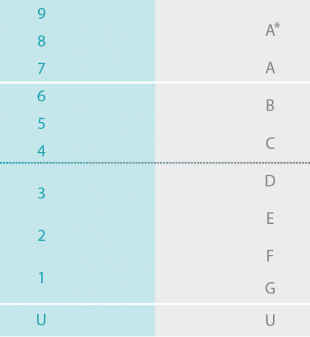Tutorials, Study Guides & More

Grades in essay results
August 23, 2009 by Roy Johnson
sample from HTML program and PDF book
1. There are two systems of essay grades commonly used in further and higher education [in the UK]. One is the numerical percentages system of grades (from 0 up to 100) and the other is the alphabetical letter system (from A to E, F, and G).
2. Older, traditional universities sometimes employ a similar system, but using the initial letters of the Greek alphabet – Alpha, Beta, Gamma, and Delta.
3. Those using the English and Greek letter system often employ the further refinement of a plus and minus system to provide a greater degree of discrimination. In this system, the grades Beta-plus (B+) and Alpha-minus (A-) represent incremental grades between Beta and Alpha.
4. Although these systems are in widespread use, there might be minor local variations. An example of the other common [sixteen-point] marking scheme is given below. See also the section on assessment.
5. In numerical percentages especially, there is sometimes a sense of fuzziness about the distinctions between one grade and the next. It is also quite common not to award percentages over eighty.
6. The percentage and letter grades, corresponding to the standard university degree classification, are as follows:
7. For most courses, the boundary between a pass and a fail will be forty percent. Below this there can be different levels of failure. A tutor might award thirty-five to record a near miss. This could permit a student to re-submit a piece of work or maybe to re-sit an examination. The band of marks between thirty and forty is sometimes called a ‘compensatory pass’.
8. A mark as low as twenty-five suggests a basic misunderstanding or a serious lack of achievement. Below this, there are further possible degrees of failure. These marks may sometimes be designated as E, F, and G in the letter grading system – though some institutions stop registering grades at D.
9. Low marks for individual pieces of work might nevertheless be significant depending on the system for calculating an overall course grade. One single low essay grade on a course might bring down an average score – or it might be disregarded as an aberration if all other grades were high.
10. Above forty percent there is a band of ten marks which designate a ‘bare pass’. The question has been considered, but that is all. The answer might be weak and hesitant, either in the arrangement of its ideas or in the quality of its arguments and evidence . The manner of expression might also be shaky. This band corresponds to the D grade in the letter system or a third (III) or pass mark in the traditional university system.
11. Work which scrapes through the pass mark will usually suffer from a number of weaknesses. The answers might have been very short, the focus of the argument might have wandered on and off the required subject. It might lack coherence and structure , and the expression may have been hesitant or clumsy. In work of this calibre there is often no indication that the student knows which is the more and which the less relevant part of the argument.
12. The higher the grade awarded to an essay, the greater must be the proportion of material it contains which is directly related to the question. Conversely, there should be as little as possible which is not relevant . The success of the work, in almost all cases, is directly related to the ability to focus single-mindedly on the question topic(s).
13. Next comes the band between fifty and sixty percent. Grades at this level represent a greater degree of competence, both in terms of handling the issues and the manner in which they are expressed. There may be a greater degree of fluency in the written style, and the generation of ideas. More supporting evidence may have been offered, or examples discussed. However, there will still be weak patches, and possibly mistakes or omissions which dilute the overall effect of the essay. This band corresponds to the C grade or the lower second (II.ii) in the other grading systems.
14. Grades between fifty and sixty are perfectly respectable. They represent rising degrees of competence in handling the issues raised by the question. These grades reflect an average ability in the subject at this level – yet they often seem to cause more problems than any other grades. Many students imagine that such results represent a humiliating failure to succeed, when in fact they demonstrate competence and success – albeit at a moderate level.
15. In the next band, between sixty and seventy, there will be a rise in the quality of written expression, argument and evidence . There will also be far less extraneous material and usually a greater degree of self-confidence in the writing. The essay will demonstrate an ability to focus attention on the question. This is a standard which shows a well informed and firm grasp of the issues involved, and the intellectual capability to deal with them. This band corresponds to the B grade or the upper second (II.i) in the other systems.
16. Students often want to know (quite rightly) what constitutes the difference in quality between two results, one of which might score 59 and the other 62 percent. This is a gap of only three marks, but enough to make the distinction between a lower and upper second level pass. The answer is that the better work probably has a stronger sense of focus and structure , presents more concrete evidence, or makes a closer engagement with the details of the question.
17. The regions beyond seventy or seventy-five are normally reserved for work which is clearly outstanding in its quality, intellectual breadth, and fluency of articulation. Answers pitched at this level are likely to be very confidently presented, and they will demonstrate a breadth of knowledge and reading in the subject which make it especially praiseworthy. Marks in this band are often awarded to work which not only answers the question but say something insightful or original about it as well. This band corresponds to the A grade or first class award (I) in the other systems.
18. Keep in mind however that essay questions do not require you to be dazzlingly original. Your tutors will be perfectly happy to award good grades to work which shows that you have studied the course material and answered the question .
19. Most institutions use similar standards of assessment, even though many of them do not make the criteria explicit. Here is one which does.
© Roy Johnson 2003
Buy Writing Essays — eBook in PDF format Buy Writing Essays 3.0 — eBook in HTML format
More on writing essays More on How-To More on writing skills
Get in touch
- Advertising
- T & C’s
- Testimonials
- Why Study In The UK?
- Plan Your Studies
- Living in the UK
- News and Statistics

- Why Study in UK?
- UK Education System
- Undergraduate Degree In The UK
- United Kingdom Graduate Schools
- Most Popular Degrees In The UK
- Costs of Attending College in UK
- Top Universities in UK
- Best Business Schools in the UK
- Best Medical Schools in UK
- Best Law Schools In UK
- Best MBA in UK
- UK Tuition Fees
- UK Scholarships
- International Student Statistics in UK 2023
Learn English in the UK: A Practical Guide
- Costs of Living in UK
- Student Housing in London
- Working in UK While Studying
- Student Life in the UK
- Best Things To Do In UK
- British Culture and Social Norms
- The Cheapest Places to Live in the UK for Students
- Transport in UK
- How to Apply for College in UK
- UK Student Visa Requirements
- Studying in UK Packing List
UK Grading System

The UK education system is unique as so is the grading system applied by educational institutions. However, the reputation of British higher education is largely attributed to such efficient education and grading system. Due to this many foreign countries have embraced the UK education and grading system either complete or with minor variations.
Understanding local grading system at the university you want to apply and in the foreign country you aim to study in, it is of essential importance. If not for anything else, you need to understand it in order to convert your grades and compare that to your university grade requirements.
Often times, too many international students, find the grading system in the UK a bit intriguing. To a large extent, this is something not to be worried about and quite expected. The reasons underneath this confusion have to do with students getting used with their native grading system.
To solve this problem in no time, below we explain everything you need to know about the grading system.
Grading System in the UK
At the very beginning it is very important you recall the fact that the grading system of the UK’s constituent countries varies to a certain scale. Overall, the grading system applied in England, Wales and Northern Ireland share a lot of similarities, while the Scottish grading system is different.
Grading system in compulsory education
Compulsory education in the UK is divided into four major key stages. At the end of each key stage, students sat in various examinations and their academic achievement is evaluated against national curriculum levels. In addition to your test scores, other factors like your projects and your participation in coursework will be taken into consideration to evaluate your performance. There are 8 such levels and an additional level standing for “Exceptional performance”. Taking this periodical assessment tests is mandatory at the age of 7,11 and 14.
Following the completion of compulsory education, British students must undertake their GCSE exams to assess their learning progress up to that stage. There are two GCSE grading systems applied in the UK. As of 2018, GCSE grades in England are indicated by numbers from 1 to 9. On the other hand, in the old GCSE system used in Wales and Northern Ireland students’ achievement is evaluated using a letter grading scale from A* to G.
Grading system in UK Higher Education
The UK has a unique higher education grading system. Its most unique feature compared to traditional grading systems is that it aims to be more specific in describing students’ academic achievement.
This type of assessment method is highly valued because it offers many advantages. Most importantly it highlights your academic strengths and specific skills, therefore, it helps employers gain a better understanding of your true potential.
Since it is proved to be such an efficient tool to assess students’ performance, many foreign countries like Canada, Australia and India are using the same grading system on some occasions with small changes to fit into their own local educational context.
The UK universities use a letter grade scale from A to F to indicate their students’ academic performance. If you get an A it means you have shown outstanding knowledge whereas if you get an F it means your score is not sufficient to pass the exam.
Listed below are grades you can take at university in the UK and their definition
However, we already mentioned that UK universities tend to be highly specific when evaluating their students’ academic score. This is to say not all students who get an A have performed the same.
This marking principle is not only limited to the fact that all students who have the same grade lie into different mark bands. At the undergraduate level, final degrees are also classified according to overall students’ academic performance.
Depending on your academic achievement, undergraduate degrees are classified into the following categories:
- First-class Honours (70% and higher).
- Second-class Honours ( 50% -70%).
- Third-class Honours (40% – 50%).
First-class degree
The first-class degree or often commonly referred to as “first”, is the highest academic achievement at the undergraduate level in UK universities. In more simple terms it means that your overall academic score is equal or above to 70% of the total score you could have achieved in your undergraduate degree course. It is like saying your average grade at the undergraduate level was an A.
If you get a first-class degree it means that you have demonstrated an outstanding level of knowledge through your course and you’re highly competent at the subject you’ve studied for.
As you can easily assume the British universities apply some of the highest academic standards. That being said, in order to achieve a first-class degree, you have to be among very few students who show an outstanding level of academic achievement. In recent years the number of first-class graduates in the UK has increased smoothly, but their proportion remains small still.
Usually, your overall marking score must be at least 70% in order to be awarded a first-class degree, but sometimes changes depending on the university you’re studying at.
Quite often your grades in the first year are not taken into account in your final qualification, but your academic progress in the second and senior year definitely will.
Note that since a first-class degree requires an excellent intellectual aptitude, it is not common for UK universities to offer joint first-class degree courses. However, famous universities like Oxford, Cambridge and Glasgow do offer some courses of that kind.
Second class degree
The second-class degree is divided into two categories: upper second-class degree and lower second-class degree.
The upper second-class degree is labelled as 2:1 degree (read “two-one”). In order to be awarded a 2:1 degree (read “two-one”), your academic score must range from 60% to 69%. By definition, it means that you have shown pretty good knowledge, but there is some room for improvement.
Typically, you’re going to need an upper second-class degree if you want to enroll a master degree in the UK because it is the minimum entry requirement. An upper second-class degree also puts you in a favourable position in the job market as it is very much sought-after from employers.
The lower second-class degree is commonly known as a 2:2(read “two-two”) degree. Compared to other classified degrees described in previous sections a lower second-class degree is a lower academic achievement, therefore doesn’t draw any significant improvement in your CV and your employability.
Third Class Degree
A third-class degree is the lowest academic qualification you can get in an undergraduate degree program. Students to whom is awarded a third-class degree have taken marks between 40% and 49%, which is surely something you should not aim for.
Unfortunately, the prospects of finding a good job or succeeding in postgraduate education holding a third-class degree are low. Statistically, third-class students share the smallest proportion of undergraduates in the UK.
Note that in some cases student whose final academic score lies close to the minimum required to get a third-class degree, will still be awarded a regular degree known as Pass.
The UK Grading System and ETCS grades
European Credit Transfer and Accumulation System is a common grading framework used by European countries in order to facilitate the process of converting grades from a local grading system to another one.
The table below shows final grades in the UK and their corresponding equivalent in the ECTS system
Note however that ECTS are to a large extent optional and universities are still free to apply their own grading policies. Most of the time, the transcript of a student’s grade in Europe will contain an additional column for ECTS grades alongside local grades.
The UK Grading System and The US Grading System
Since the US grading system is very popular and many US students are attending university in the UK it is very interesting to see how does one grading system stand compared to the other.
The table below shows grades at UK universities and their equivalent in the US grading system
Subscribe Today
Join 22,141 other students interested in studying in the UK and get regular emails, articles, and scholarships sent to your inbox.
2 Million +
Students helped annually
Guides about studying in the UK
Must-Read Guides
Top music universities in the uk, uk student loans guide 2024, best architecture universities in uk, chevening scholarship application guide, more article, the transport in uk guide 2024.

Studying-in-UK.org is one of the largest information portals about studying in The United Kingdom for international students.
We publish information about the United Kingdom higher education and latest news that concern international students in the UK, as well as a large number of helpful informational content and exclusive research about international students in the UK.
To learn more about us click here.
Quick links
UK Education System List of Colleges in UK Top UK Universities UK Student Visa Requirements Costs of Attending College In UK How To Apply For College in UK Most Popular Degrees in UK Why Study in The UK UK Grad Schools Cheapest Universities in UK UK University Map UK University Entry Requirements UK Facts
© 2013 - 2023 - Studying in UK - All Rights Reserved.
- Privacy Policy
- Editorial Policy
Get special offers that you won't ever find on our blog·
- Uni Reviews
- Student Guide
- Student stories
- UK Survival Service
This article about how the UK university grading system was updated by the Great British Mag content team on 5 September, 2019
The UK grading system is not terribly different to the grading systems in China , India, USA or the EU. The top grades go to the people who excel and get very high percentages and the pass grades are given to anyone who manages to achieve the minimum grade percentage required. But that is where the similarities end.
Whereas other systems use the alphabet to demonstrate the achievements of the student, the UK system uses a class grade order. This system dates all the way back to the invention of the university itself and reflects the archetype of the British class system .
The UK grading system:
First (1 st ): The best grade you can get. The student has got higher than 70% on their course or assignment. An almost perfect piece of work. You should be very happy with it. The markers definitely were…
2:1 (upper second class): Student achieved between 60%-69%. The work was at a very good level, but there was still room for improvement. Kick back, smile and relax. You’ve done a good job! You will need to get a 2:1 or higher if you’re planning on staying on for a masters or post-graduate degree.
2:2 (lower second class): If you got 50%-59% on a course or assignment, then you have this grade. Even though it is not a perfect score it is still very good. You should still be happy about getting this mark.
Third: If you get between 45%-49%, you need to start thinking about where you went wrong. It’s not the worst mark, but perhaps some tutoring might help next time.
Ordinary degree: The absolute minimum you need to pass the course. Getting between 40%-44% is not where you want to be. You should definitely seek out some extra help if you want to do more than scrape by. Or maybe cut down on the time spent in the pub…
Fail: Anything below 40% constitutes failure. Sorry, but you will need to take the course again to pass.
RELATED ARTICLES MORE FROM AUTHOR
What is freshers week, how many hours can international students work in the uk, the innovator visa – explained, privacy overview, pros and cons of studying in the uk vs australia, what tax do i have to pay if i work in....
- Skip to main content
- All Articles
- UK Articles
- UK Applying to university
- Choosing where to study
- Choosing a subject
- Financing your studies
- Getting your visa
- Before you leave
- Housing & accommodation
- Once you arrive
- Post-study life
Understanding the Undergraduate Grading System in the UK
Get a better understanding of the UK's university grading system for undergraduates. Learn the different degree levels from a “First” to a Third class, the pass rates for each and what they will mean for your further studying and career prospects.

Updated to include 21/22 HESA Qualifying Rates.
The British undergraduate degree classification system is a university grading scheme for undergraduate degrees (bachelor's degrees and integrated master's degrees) in the UK. It has been applied in other countries, with slight variations.
When applying to study for an undergraduate degree in the UK, many students are not aware that they have an option to study for a regular degree or a degree with honours. The latter is the most popular degree applied for in the UK. If applying for a bachelor’s degree in science, for example, you will see “Bsc (Hons)” as the qualifications you will receive. The “Hons” states that you will be studying an honours degree for that course. If you were to apply for an ordinary science degree, you will see “Bsc”.
When you study for an ordinary degree, the aim is to pass and achieve a degree in your subject. If you do not pass, you simply do not get a degree. You will not get a failed degree, but you will fail to achieve a degree. It is similar to a driving test, where passing will gain you a license and failing will not give you a licence.
An honours degree will not only give students a degree, but it will specify your level of achievement and speciality in that subject by awarding classifications. For this reason, it is far more popular, as it gives employers an opportunity to understand a graduate’s competency.
The table below shows the different honours degree classifications and their average alternative grading descriptions (it is worth noting that Open University (OU), which is a distance learning university with an open entry policy, has different grade boundaries):
What is a First degree?
First Class Honours degree (1st), commonly known as a “first”. A first class is the highest honours degree achievable. Although it is now usually impossible for students to study two full undergraduate subjects, some universities award “double firsts” when a student achieves a first class degree in two separate subjects, while studying one joint honours degree. The universities of Oxford, Cambridge and Glasgow have been known to award “double firsts”. A first class degree is achievable with very hard work and passion for your subject. Those who achieve this much desired classification are in the strongest position for employment, graduate programmes and acceptance for post-graduate study .
From 2016 to 2021, the percentage of students’ achieving first class honours has increased from 26% to 36% according to the Higher Education Statistics Agency .
What is 2:1 degree?
Second-class honours degree, upper division. A second-class degree is split into two divisions and the higher of the two divisions is the upper second class, commonly known as 2:1 (pronounced “two-one”) and often written as a 2.1. A 2:1 also puts you in a good position for employment, graduate programmes and post graduate study. For some institutions and for some employers, this is the minimum grade acceptable. Like a first class honours, the number of students achieving a 2:1 has increased significantly in the past few years. According to the Higher Education Statistics Agency, 46% of all full-time graduates achieved a 2.1 in the academic year of 2020/21.

What is a 2:2 degree?
Second-class honours, lower division. This is the lower division of a second-class degree. It is commonly known as a 2:2 or (2.2 degree) “Desmond” (as in Desmond “two-two”). A 2:2 degree is often the minimum grade required for most opportunities in employment and further education. In the 2020/21 academic year, 14% of students achieved a 2:2.
Third class
Third-class honours (3rd). Commonly known as a “third”, this degree is the lowest level of honour's degree achievable. Very few graduates achieve a third-class honours. In 2020/21, only 3% of students graduated with a third. Receiving a Third-Class degree is going to severely limit your prospects for postgraduate study, particularly abroad.
Breakdown of qualifiers obtaining each classification in the UK, 2017 to 2022
In some institutions, if an honours student fails to achieve a third class by a small margin, they will be awarded an ordinary degree. Until the 1970s Oxford University awarded fourth class honours.

'Study in the UK' eBook
Enjoy what you’ve read? We’ve condensed the above popular topics about studying in the UK into one handy digital book.
Search for a course

How to apply to study in the UK
The British education system is one of the most prestigious in the world. A degree from a top UK university will certainly help you to succeed in your chosen career. However, with universities being well-known internationally, this leads to a competitive application process. In this article, we review and simplify the application process so you know exactly what to expect. Understanding the higher education system in the UK

Are international students eligible for Clearing?
As an international student, it’s possible that you may have heard of a process called clearing. Although you may be aware of it, it may also be true that you’re not entirely sure what clearing is or how it relates to you. We’re here to take you through all aspects of the process, demystify any preconceptions that you may have and equip you with all the necessary knowledge should you go through clearing yourself. What is clearing? First

University applications: An admission officers top tips
As an international student getting to grips with the application process can sometimes seem like an uphill battle. You may not be sure what to include with your application, how long it will take to hear back from a university and how best to increase the chances of making a positive impact on the person evaluating your application. With this in mind we decided to pick the brains of those making the decisions, admissions officers. We give you exclusive access to

Undergraduate pathways in the UK
Access or foundation courses enable you to bridge the gap between the qualifications you already have and those required by the UK college or university of your choice. This gap often exists because students in many countries complete 12 years of education before they start university, but in England, Northern Ireland and Wales, they complete 13 years. International Foundation Year (IFY) programmes offered by colleges in the UK lead to

Get in touch
Clearing Universities & Courses
Clearing advice.
Recommended Clearing Universities
Popular Course Categories
Course search & discover.
Start the search for your uni. Filter from hundreds of universities based on your preferences.
Search by Type
Search by region.
Recommended Universities

Ravensbourne University London
London (Greater) · 88% Recommended

City, University of London
London (Greater) · 92% Recommended
.jpg)
The University of Law
Search open days.
What's new at Uni Compare

University of Bedfordshire
Bedfordshire has a 95% graduate employment rate for career prospects, find out more!

Ranked #4 in World University Rankings (Masters In Marketing 2024) - click here!
Ranking Categories
Regional rankings.
More Rankings
Top 100 Universities
Taken from 65,000+ data points from students attending university to help future generations
About our Rankings
Discover university rankings devised from data collected from current students.
Guide Categories
Advice categories, recommended articles, popular statement examples, statement advice.

What to include in a Personal Statement

Personal Statement Tips
How does the uk university grading system work.
Whether you’re already studying or are about to, it is important to understand how the UK university grading system works.

When it comes to studying an undergraduate or postgraduate degree in the UK, grading systems vary. Whether you’re about to start your degree, or you are close to the third year of your course, it’s important to understand how your final grade will be calculated. Luckily, it’s easy to understand.

University grading: degree classifications explained
Universities in the UK follow a standard grading system for degree classifications based on the overall percentage achieved. The four university grade boundaries are:
- First-Class Honours (1st) (70% and above): Exceptional academic performance
- Upper Second-Class Honours (2:1) (60-70%): Strong performance, most common degree class
- Lower Second-Class Honours (2:2) (50-60%): Satisfactory performance, widely accepted by employers
- Third-Class Honours (3rd) (40-50%): Minimum passing grade for an honours degree
What is the postgraduate grading system in the UK?
The British postgraduate grading system differs quite a bit from the undergraduate one. Depending on whether you are undergoing an Integrated Masters Degree or a Standalone Masters Degree the grading system will differ. Like undergraduate, Masters Degrees are graded by creating a weighted average, combining all your module results from the year(s).
An integrated masters is one which follows directly from an undergraduate course. Common in Science degrees, where you apply for a four year course. In your second year you will be able to choose to either complete a Bsc (Bachelor of Science) or follow the path to achieve an MChem (Masters in Chemistry) etc. Integrated Masters degrees are graded the same as undergraduate degrees.
Standalone Masters include Masters Degrees by Research and Taught Masters Degrees. Masters degrees by research commonly referred to as MRes or MPhil are focused more on individual research skills with less taught modules. These degrees are usually graded as a pass or a fail.
Taught Masters degrees require a total of 180 credits. These credits are split between assignments, assessments and a dissertation or final project. Each module will have a certain amount of credits attached. For example, you may have single modules weighted at 15 credits, double modules (that span over two semesters) at 30 credits and a dissertation weighted at 60 credits. As taught, Masters Degrees are typically only a year long, every module counts to your final grade.

Instead of a First, Upper Second, Lower Second and Third, there are only three grade classifications for a Masters Degree. These are Distinction, Merit and Pass. The boundaries for these may vary depending on your university, however the common boundaries are shown below.
- Distinction: much like a First at undergraduate level, a Distinction is awarded when you achieve a percentage grade of 70% and above.
- Merit: you’ll be awarded a Merit if you achieve a grade average between 60-69%.
- Pass: a pass is awarded when you receive a grade average between 50-59%.
- Fail: If you do not receive at the minimum an average of 50%, the Masters qualification is not awarded. If you do think you are heading towards failing, try not to stress. You can speak with your module leaders about retaking any assignments or examinations to bump up your grade.
What can I do if I think I am going to fail my degree?
If you feel as if you are heading towards failing your undergraduate or postgraduate degree try not to panic. Easier said than done but you do have plenty of options.
As an undergraduate, you have three or four years to make up the credits you need to pass your course. Therefore, you are able to retake any modules you have failed in other years. For example, if you fail a Film module in first year, you can retake this module in your second year. If you fail numerous modules you are able to retake the entire year.
Another option is to retake any failed assignments or examinations throughout the year. This is easily done through referral or deferral assessments. Referral assessments are like resits, whilst deferrals allow students to postpone any assessments or extend any coursework deadlines. To qualify for a deferral you will need to prove that your performance has been affected by a personal circumstance (e.g. medical condition). To be granted a deferral you will need to fill out an application. Referrals and deferrals can be implemented at both undergraduate and postgraduate levels.
Finally, if you feel as if your grade is an unfair reflection on your work you can submit an appeal. If you do this, your mark will be re-marked or looked back over by an examination board or your lecturers. Simply speak with your lecturers if this is something you would like to do.
Interested in going to university? View our university rankings and league tables to help you with your decision.
undergraduate Universities
Undergraduate uni's.

Ravensbourne

245 courses
.jpg)
Uni of Sunderland
200 courses

Uni of East London
317 courses

Uni of Winchester
161 courses

Uni of Bedfordshire
336 courses

Middlesex Uni
469 courses

Uni of Roehampton
268 courses

Uni of Leicester
267 courses

Northeastern Uni

West London IoT

ARU Writtle
104 courses

Uni of Kent
417 courses

528 courses

Heriot-Watt Uni
208 courses

Kingston Uni
378 courses

Goldsmiths, UOL
273 courses

Leeds Beckett Uni
327 courses

238 courses

Uni of Hertfordshire
419 courses

Uni of Surrey
437 courses

Cardiff Met Uni
304 courses

Uni of Chester
399 courses

Uni of Portsmouth
542 courses

Uni of Suffolk
109 courses

Swansea Uni
780 courses

Coventry Uni
445 courses

Uni of Bradford
197 courses

Uni for Creative Arts
323 courses

Staffordshire Uni
272 courses

414 courses

Uni of Westminster

Anglia Ruskin Uni
460 courses
,-Bristol.jpg)
UWE, Bristol
249 courses

Leeds Arts University

Uni of Essex
797 courses

Wrexham Uni
168 courses

355 courses

Escape Studios

Uni of C.Lancashire
438 courses

Uni of Huddersfield
458 courses

Uni of Brighton
253 courses

Bath Spa Uni
295 courses

Edge Hill Uni
243 courses

Uni of Hull

Nottingham Trent
539 courses

Edinburgh Napier
184 courses

Uni of Reading
393 courses

Queen's Uni
411 courses
Want to learn more about a university?
Get your questions answered by sending them an enquiry now.
Imperial College London Imperial College London
Latest news.

Superfast physics and a trio of Fellows: News from Imperial

'Living paint’ startup wins Imperial’s top entrepreneurship prize

Imperial wins University Challenge for historic fifth time
- Success Guide - undergraduate students
- Imperial students
- Success Guide
- Assessments & feedback
- Improving through feedback
Understanding grades

Getting a mark over 50% means that you are beginning to understand the difficult work of your degree. Getting over 60% is excellent because it means you have demonstrated a deep knowledge of your subject to the marker.
You may be used to getting marks of 90–100%, but this is very unlikely to happen at university. Remember that marks in the 50–70% range are perfectly normal. Your grades will improve as you get used to working at university level, and in the style required by your degree subject.
Degree classifications
UK degree classifications are as follows:
- First-Class Honours (First or 1st) (70% and above)
- Upper Second-Class Honours (2:1, 2.i) (60-70%)
- Lower Second-Class Honours (2:2, 2.ii) (50-60%)
- Third-Class Honours (Third or 3rd) (40-50%)
Visit the Regulations for further information on degree classifications.
In your first year at university, achieving a grade of 50% or more is a good thing. You can build on your work and improve as you work towards your final grade. Scores above 70% are classed as “First”, so you should be very excited to get a grade in that range.
It is rare for students to achieve grades higher than 90%, though this can happen. Remember as well that you will be surrounded by other highly motivated and capable students, so you may not automatically be top of the class anymore! Don’t worry – lots of your fellow students will be feeling the same, and there is always someone you can talk to about this. Having realistic expectations about your grades will help to reduce the possibility of feeling disappointed with yourself.
How to get a high mark
Before starting a piece of work, make sure you understand the assessment criteria . This may vary depending on your course and the specific piece of work; so ask your tutor if you are unsure.
In general, high marks will be given when you display that you have clearly understood the subject and included relevant detail. The best marks will go to students who show that they have read around the subject and brought their own analysis and criticism to the assignment.
Low marks will be given to a piece of work that suggests you don’t understand the subject or includes too much irrelevant detail. This applies to coursework and exams, so planning your work before you start is always a sensible option. Speak to your tutor if you are unsure about the requirements of a specific piece of work.
Don’t be afraid to ask
You may encounter different classifications, or courses that don’t use exactly the same boundaries. If you need help understanding the exact requirements of your course, contact your tutor for clarification.
When you’ve had your work returned to you, remember to look at the feedback to see where you could improve – this will give you the best chance of achieving a better grade in the future.

- Scholar blogs
How does the grading system work at UK universities? A Chevening guide
- Facebook facebook
- Twitter twitter
- Linkedin linkedin
- Whatsapp whatsapp
- Facebook facebook (opens in a new window)
- Twitter twitter (opens in a new window)
- Linkedin linkedin (opens in a new window)
- Whatsapp whatsapp (opens in a new window)
The way most UK universities grade essays and exams can be confusing – let’s break it down.
Grading systems work differently all around the world. Some countries use letter grades – A or A+, B, C, and so on – or numerical grades like 1, 2, 3. In many places, top grades are only awarded to students who get 90% or higher on an essay or exam.
The UK is a little different.
While most UK assessments are scored out of 100, the grade boundaries work differently and will have different levels of difficulty to what you might be look to. Here’s what each grade means.
Overall, the pass grades at UK universities are as follows:
- 70-100: first-class, known colloquially as a “first” (I)
- 60-69: upper second-class, a “two-one” (II.i)
- 50-59: lower second-class, a “two-two” (II.ii)
- 40-49: third-class, a “third” (III)
Usually, anything below 40 is a fail grade, though it’s worth double-checking the precise grade boundaries at your institution. Here’s what each pass grade means in practice.
Grades between 80 and 100 are exceedingly rare, especially in essay subjects with more subjective grading systems. In science subjects with objective right and wrong answers to questions, you may see scores of 90%. However, this is virtually impossible in the humanities – if you receive an 80 on an assessment, you should be very proud of yourself!
In many universities, receiving a grade of over 80 lets you know that your supervisors think your work is of publishable standard, in other words potentially worthy of submitting to an academic journal.
Think of it as the equivalent of an A+, and a cause for celebration!
Most first-class degrees land in the range of 70-79%, however these grades are still the top of the class and therefore not a guarantee. It will take a lot of hard work to get your grades up to this standard, but it’s well worth it, as a first-class degree can set you up well for a great career.
An upper second-class, or “two-one” is considered a good grade, similar to a B elsewhere in the world. If you’re a good student, it is likely that your essays will fall in this range, with an extra push required to reach first-class levels.
A lower second-class, or “two-two”, is still a pass grade, though not a strong one. You may find that when you first arrive you receive a couple of lower second-class marks, but don’t panic. This is a mark that you can build on.
Scores in this range are still pass grades, but you should consider them a warning sign that you’re struggling with the material. If you receive a score in this range, go over your feedback carefully to see what you could improve for next time.
Chevening’s tips for improving your grades:
- Keep track of each of your assessment marks and the feedback you get to improve for next time.
- Always ask your professors for feedback, even when you get a good mark. It’s just as important to know what you did right as what you did wrong!
- Make sure to check the criteria for a first before you start your assessments – that way you know what your examiners want to see from you, and you can make sure to deliver it.
By Amy Hughes
UK University Grading System
A 2022 guide for international bachelor and master students.
The Undergraduate Grading System in the UK
The Undergraduate Grading System in the UK has a unique structure. It has moved away from the number or letter grading format that other countries follow. This specific system was introduced to offer future employees a deeper insight into the students individual skills and academic strengths.
The Honour System
Students in the UK will work towards either an Honorary Degree or an Ordinary Degree.
- Honours Degree: The Honours Degree consists of 3-4 years of study and submitting a dissertation or thesis in the final year. The grading system used in this case provides more insight into the students overall performance throughout their degree.
- Ordinary Degree: This style of degree is more common in Scottish Universities. Students study for an ordinary degree, and in their second or third year have the option to do a fourth year to achieve an honourary degree.
The Honours Degree
An Honours Degree is the most popular option in the UK. There are four different grades awarded in this style of degree:
Table One: Table One shows the four honorary grade boundaries for universities and their assigned percentage range.
Universities in England, Wales and Northern Ireland follow this grading system, whilst Scotland has its own structure . Each grade boundary has set guidelines so that it is clear for tutors what grade to award each student’s piece of work.
First-Class Honours Degree

This is the highest mark awarded by the majority of universities in the UK. It is more commonly referred to as a “first” by those in academic circles. This score reflects the students’ understanding of their chosen subject, and an ability to complete their works to an extremely high standard. To be awarded this mark also has promising career prospects for employment and acceptance into postgraduate studies. Not just this, it is often an indication that students with this mark will enter higher paid work or get a scholarship for further education, compared to students with a lower pass grade. Over the past few years, more students are being awarded this notable grade but it still carries the prestigious flair that it always has.
Whilst a First-Class Honours Degree is the highest mark awarded by most UK Universities, a handful of universities award a higher mark to exceptional students. A Double-First-Class Honours degree is awarded in Cambridge, Oxford and Glasgow. This grade is uncommon, and is given to students who achieve First-Class Honours in two undergraduate programmes. To attain this, students would have to join a joint first-degree course.

Second-Class Honours Degree
The second class honours covers a large percentage range. This is the largest overall margin in all three honour sections. To make this more specific, the UK Grading System has divided this class into two; Upper Second Class Honours Degree and Lower Second Class Honours Degree.

Upper Second Class Honours Degree
The Upper-Second Class Honours, or “2:1” (pronounced two-one) as most people refer to it, is the second highest grade awarded to students at university. This mark displays that the student has an overall understanding of the subject but there is room for developing this further. It is the minimum entry requirement for students who wish to pursue a Masters Degree. Employment opportunities are still widely available for this grade, and is a positive addition to your CV.
Lower Second Class Honour Degree
The Lower Second Class Honour Degree is normally shortened to “2:2” (pronounced two-two). This grade is considered the lowest acceptable grade for work opportunities and further education. It is still noteworthy in your CV, but would need to be boosted with extra curricular studies or volunteering programmes related to your subject for real substance.
Third Class Honours Degree
A Third-Class Honours Degree, “third”, is the lowest level awarded in a honours degree. It is statistically the least awarded mark given to students in UK universities . This grade is unlikely to increase your job opportunities, or help you enter a postgraduate programme.

In general, any grade below 40% is a fail. This means that the module or academic year will need to be retaken. If the student’s mark is close to the third boundary on completing their degree, then they could be awarded an ordinary degree. This is only offered by some universities in the UK, and often only given in exceptional cases. This is also an option if the student leaves the course after two years. In both these cases, the student will have passed enough to receive an ordinary degree but not enough to achieve an honours degree.
The PostGraduate Grading System in the UK

If you want to further your academic career after your Bachelor Degree, chances are you will enter into a Masters’ programme. There are two types of Masters’ Degrees; an Integrated Masters’ Degree and a Standalone Masters’ Degree.
- Integrated Masters Degree: This style of masters degree includes both an undergraduate course and a postgraduate course. It generally follows on from your bachelor degree, and provides students with a longer period of learning in one subject. In general, the undergraduate degree takes three years, and the postgraduate degree takes one year. As it combines two degrees into one, it uses the same grading system as the undergraduate course.
- Standalone Masters Degree: A Standalone Masters’ degree or simply Masters’ Degree is the highest qualification awarded in some courses. This style of degree is useful if you want to specialise in a particular field related to your undergraduate course, or move away into another branch of the subject. It often involves a large amount of research. A masters degree can take between one to two years to complete depending on the course. The duration of the Masters’ Degree also depends on if the student is able to study part-time or full-time.
The grading system for the Masters’ Degree is different to the Bachelor Degree:
Table Two: Table Two displays the different grades awarded in a Masters’ Degree, and the percentage attached to each one.
The overall score of a Masters Degree is out of 180 credits; each module will be awarded 10-30 credits and the dissertation is made up of 60 credits.

A Comparison between the UK and other country’s University Grading systems:
As mentioned throughout this article, the UK has a different way of grading students at universities than other countries. Whilst some have adopted this format, the majority use a different technique to assess their students . The following countries will be compared to the UK University Grading System so you can see the different styles:
- European Credit Transfer and Accumulation System (ECTS)
The UK Grading System and the Scottish Grading System
The UK grading system is followed by England, Wales and Northern Ireland. Scotland has a different way of grading students, which follows the letter grading system:
Table Three: Table Three compares The Scottish University Grading System with the UK.
The UK Grading System and the US Grading System
It is interesting to compare The UK and the US’s grading structures as they are popular choices for further education.
Table Four: Table Four presents how the UK Grading System differs from the US.
As you can see, the US uses a letter system for grading students at an undergraduate level. This is also combined with a Grade Point Average (GPA). The GPA is a grading structure that produces a grade between 0 (low) and 4 (high). Universities often use different guidelines to calculate the final grade but the GPA awarded in the undergraduate degree is always out of 4.
The UK Grading System and ECTS Grades
Europe has a standardised grading system. This is used to convert individualised university scores into a general grading structure for all countries . It is beneficial for students who want to study at university in another country. The grading system is called the European Credit Transfer and Accumulation System (ECTS) and is different from the UK’s structure.
Table Five: Table Five reveals the variation between the UK’s grading system and the ECTS.
Many European countries and individual universities within these countries opt for their own grading structure, which makes the ECTS all the more important. Most grades will have both the university’s score and the ECTS.
What is the education structure in the UK?
Primary School is for students between the ages of 4-11. The qualification taken as they move into secondary school is the Standard Attainment Tests (SATs). From the ages of 11-16, students go through secondary school. At the end, they take their GCSE exams. The next stage of schooling is further education. This includes A levels, a University Foundation Course or an IB Diploma. Students generally take these qualifications between 16-18 years. This leads them onto Higher Education in either an Undergraduate Degree, a Masters’ Degree or a Doctor of Philosophy.
What is the Compulsory Education Grading System in the UK?
Students take their GCSEs at the end of what the UK calls Secondary Education. This is scored using a letter structure from A* to F. In 2018, England moved away from the traditional grading structure, and introduced a number system:
The number sequence that England now uses runs from 1-9. The new grade compared to the old letter structure is as follows: 9 and 8 replaces the A*, 7 is used for an A, 6 and 5 both take the place of the B grade, 4 equals a C grade whilst 3,2 and 1 represent D, E, F and G.
Wales and Northern Ireland still use the original system. In Scotland, students take the National 5 (N5) Qualifications as opposed to GSCEs. This is scored using the traditional letter grading system used in the UK.
What is the Further Education Grading System in the UK?
Further Education is the time that students produce grades to enter into University. For these studies, students reduce the number of subjects they take during compulsory education. They specialise in fields that interest them, and that can lead them into higher education. This is often in the form of A Levels or Foundation Courses.
These are graded using the letter structure. Each letter grade represents a percentage range: A (80-89%), B (70-79%), C (60-69%), D (50-59%), E (40-49%) and Ungraded (U) (0-39%).
What happens if I fail?
Your overall degree is made up of credits from essays and coursework throughout your undergraduate programme. If throughout your degree you fail any part, you have the following options:
- A referral: This occurs when a student requests to retake a failed assignment, module or even a full academic year. A referral assignment or module is often completed during the following year. When a student fails a full year, they can retake it the next year.
- Defer: A deferral is awarded to students who can show that due to personal reasons they were not able to complete an assignment or year to their full potential. You will need to complete a form explaining your reasons and why you feel it is important that you are allowed to retake.
- Appeal your mark: Students who feel that they have been unfairly assessed, can appeal their grade. You will need to discuss this with your tutor who will start the process.
In some instances if a student fails by a few points off a third degree it is up to the universities’ discretion to award that individual an ordinary degree .
What is the best way to get a high grade?
The best way to get a good mark is to show that you have truly understood the topic. This can be shown by writing strong arguments in your essays. Relevant further research is key, as it shows that you want to extend your knowledge in this field. Be sure that you weave this into your overall assignment to add weight to your main points. It is important that you not only read the essay question, but dissect it, so that you understand exactly what your professor is wanting you to discuss.
What is the grading system in Canada?
The Canadian Grading System varies from province to province. The letter structure is used in Saskatchewan, Nova Scotia, Newfoundland and Labrador, British Columbia and Alberta. Whilst they all use the letter system, the percentages attached to each grade can be different in different provinces. Manitoba, Ontario, Quebec, New Brunswick and Saskatchewan combine the letter system with a number grade. Similar to the letter system used in some provinces, the numbers and letters assigned to each grade varies. An example of this is that Ontario uses a 1 to 10 number structure to score students grades, whilst Manitoba grades with the US GPA system.
Carolyne Tomisson
Related articles.

Study in the UK – The Ultimate Guide

Understanding the UK Grading System: A Guide to Marks, Grades and Quality Assurance
Their academic excellence and world-class educational system make the universities of the UK renowned. They emphasize research-based instruction, creativity, and innovation in the curriculum, and they collectively evaluate and grade several curricular activities along with exams at the end of each academic session.
In the UK, a unique grading system is applying for assessing the performance of students, which has a somewhat complex terminology and structure. The combination of numbers and letters it comprises can be difficult to understand for newcomers and foreign students who are familiar with it.
This article will discuss the UK grading system to help you understand the complexity that the simple alphabet and numbers carry and to provide insights into the grading scales and degree classification that portray academic success in the UK.
Why is it difficult to understand?
- The system is more complicated than systems that only use letters or percentages since it uses letters A*, A, B, etc. as well as numeric values 9, 8, 7, etc.
- There are distinct definitions for each grade that tell what the grade means in reference to the performance of a student.
- The UK’s grading system constantly reviews and develops to maintain its quality.
- Here it not only includes individual grades but also degree classifications such as First-class, Second-class etc.
Why it is a reliable grading system?
The UK grading system, which educational institutions use to ensure fairness, uniformity, and the correlation between grades and learning objectives, relies on various procedures for quality assurance. The main parts of quality control are as follows –
- Universities call for external examiners, who are either from other institutions or are subject professionals with good experience, to check and validate the evaluation process. They ensure the upholding of academic standards and the consistency of grading.
- Institutions use a moderation method in which several evaluators grade the same examinations or assignments. It ensures consistency in marking and keeps things fair, resolving differences if any.
- It is essential to have precise and transparent standards for evaluation. Institutions outline the expectations for each grade and detail the standards for assessment in the instructions given to assessors and students.
- To reduce biases and inaccuracies, two different evaluators frequently assess high-stakes assessments like dissertations or theses through double-marking.
- Assessment teams hold regular meetings to discuss grading procedures, provide feedback on them, and ensure they align with institutional norms.
What are Marks and Percentages?
The majority of UK educational institutions base their grading system on the proportion of right answers, the calibre of assignments, or the performance on tests when giving marks and percentages.
In an exam or assignment, a student who scores 80% receives 80 marks out of 100, and institutions determine the corresponding grade, which varies depending on the institution and the level of education.
UK’s Main Grading Framework
To evaluate academic success, the most popular grading system in the UK uses letters and occasionally numbers, with some slight variations between institutions. A breakdown of the main grading system is provided below:
- A* (A-star) – It is the highest grade given for outstanding performance, with above 90% marks.
- A – It indicates Excellent performance and is given for marks ranging between 70% and 89%.
- B – Good performance is graded with a B, given for a score between 60% and 69%.
- C – Satisfactory performance is signified with this grade which ranges between 50% and 59% marks.
- D – A pass but has scope for improvement is often represented with D with marks from 40% to 49%.
- E – A just pass is given an E grade, with around 30% to 39%.
- U – Ungraded, which indicates failure to score the minimum required marks.
Universities assign numerical values to denote these grades to increase accuracy, equating A* with a value comparable to 9, A with 8, and so on, while valuing U at 1. This numerical system makes it easier to calculate Grade Point Averages (GPAs) and also assists with quality control in general.
Degree level according to grades
An important part of the UK grading system is degree classification which decides how an undergraduate degree will turn out in the end. The following categories of classification are –
- First-Class (1st) – A degree with this class is given when a student scores overall 70% or above marks throughout the academic years exhibiting exceptional performance.
- Upper Second-Class (2:1) – To receive a degree with this class a minimum average score of 60% and a maximum score of 69% is required which shows a good level of academic achievement.
- Lower Second-Class (2:2) – Indicating a satisfactory performance a degree with this class is attained with an average mark of between 50% and 59%.
- Third-class (3rd) – Awarded for a pass with some room for improvement, a third-class (3rd) is a class that ranges from 40% to 49% on average.
- Pass – Given for an average score of between 30% and 39%, which demonstrates just pass-level performance.
- Fail – An average grade of less than 30% is considered a failure, hence it is given this designation.
Certificates of Honour
Many undergraduate programs in the UK offer honours degrees, which generally require students to achieve at least a lower second-class (2:2) degree classification. Employers highly recognize honours degrees, and they can be helpful in various job prospects. The level of academics is higher and more difficult in such a degree which requires more in-depth study, upper-level academic writing and investigation signifying a greater level of qualificational achievement.
Grades for master’s and PhD degrees
The UK grading framework for master’s and Ph.D. degrees is based on similar concepts as postgraduate grading but may vary depending on the institution and program. Master’s degrees use divisions like Merit, Pass, and Distinction according to defined grade scales.
Doctoral programs sometimes use terminology such as “Pass,” “Minor Corrections,” and “Major Corrections” in their evaluations, reflecting the standards of doctoral research against which they assess candidates.
The grading system of UK with its well-organised structure and strong quality assurance measures stands out to be one of the fairest and most consistent systems to assess academic performance. Students beginning their academic path or pursuing higher education in the UK must have a thorough understanding of it. Knowing the complexities of marks, grades, and degree classifications can help students pursue their educational careers with confidence and make decisions about their future efforts in the UK with knowledge. The grading system of universities is quite rigid and also has a different level of passing criteria. Students find it challenging to clear their semesters with good marks. Scholars in colleges encounter various pain points, including difficulty in collecting information, conducting time-consuming research, and facing a lack of learning materials, sources, and guidance. Such types of problems often trigger the students to seek Assignment Help from the academic writing service providers. Getting help from professional experts could be useful for the students to deal with academic pressure as well as other related issues.
Leave a Comment Cancel reply
Save my name, email, and website in this browser for the next time I comment.
Recent Posts

Maplewood home Renovation: A guide to transforming your dream space

Finding the Perfect Pair: Your Complete Guide to Prescription Sunglasses

Asim Jofa Wedding Collection 2024 A Timeless Elegance

The Art of Customized Wholesale Single Cigar Packaging Boxes

Unlocking the Value The Importance of Vape Packaging Boxes

How Display Boxes Elevate Your Product in the Market

Pushing Your Brand Forward With Custom Cardboard Display Boxes

Tips for Getting Into the Master’s Program You Want
UK Grading System Guide 2024: Everything You Need To Know!
Link Copied
Share on Facebook
Share on Twitter
Share on LinkedIn
.webp)
Ace it as you face it!
Were you the one student who worried excessively about your grades? Although we recognise your concerns and anxiety, you should know how different grading systems, like the US grading system, Australian grading system, and others, may differ from institution to institution within the same nation. Given its prestigious universities, quality education, and assurance of a high standard of grade system to establish a benchmark globally, the UK is a popular destination for students worldwide. In this blog, we decode the UK grading system and UK grading scale, student assessment, the differences between the British grading system vs American, and much more to help you better navigate through your education in the UK.
What is the UK Grading System?
Did you know that universities in the UK have a unique UK grading system? The UK grading system is a numerical or alphabetical scale used to evaluate students' performance in schools, colleges, and universities. The UK grading system is consistent across England, Wales, and Northern Ireland, whereas the Scottish grading system differs from all three. The carefully designed UK grading system considers factors other than academic performance, such as a student's participation in extracurricular activities.
It's one of the reasons the British grading system and higher education is so well-regarded around the world. Moreover, many countries have adopted the UK grading system or a variation of it. When you're looking to study abroad, familiarising yourself with the university grading system in the UK you want to attend is important. Remember that if you plan to study in the UK, you need to know everything about studying in the UK and applying for a UK visa; check out the UK student visa to know more. This way, you'll know how to convert your grades and see how they measure up to the requirements. Don't stress, though! We've got you covered. Here is everything you need to know about the UK grading system.
How are UK university students assessed?
The students in the UK grading system are assessed using various methods, such as:
1. Exams - These assessments review the student's knowledge 2. Coursework - This assessment is practical or written and includes reports, projects, lab reports, and presentations. 3. Oral - Here, they check the student's ability to communicate their thoughts and ideas effectively. 4. Practical - This assessment checks the student's ability to utilise theoretical knowledge in practical solutions. 5. Portfolios - This is a form of assessment that combines a student's work throughout their course. This kind of assessment is found in art or fashion programs. 6. Dissertations - It's a big research project that students usually have to submit in their final year of study. Want to know the best ways to get started? Please read through our blog on the 10 Tips on Writing a Dissertation and find your way!
What is GCSE?
GCSE stands for General Certificate of Secondary Education . These are the qualifications obtained by fifteen and sixteen-year-olds in the UK at the end of their Year 11 schooling. GCSEs provide a uniform framework for assessment in England, Wales and Northern Ireland. Schools in Scotland pursue Scottish Qualifications Certificates, and chosen subjects are studied over two years and assessed by final exams or coursework.
While students have the scope to choose some of their GCSE options, several subjects are obligatory. These are known as core subjects and include- Maths, English Literature, English Language, and Science (in varying forms). GCSE syllabuses are set, examinations administered, and certificates awarded by five primary examination boards:
1. AQA (Assessment and Qualifications Alliance) 2. CCEA (Council for the Curriculum Examinations and Assessment) 3. Edexcel 4. OCR (Oxford, Cambridge and RSA) 5. WJEC (The Welsh Joint Education Committee) These are overseen by regulatory authorities to ensure parity between schools using a different exam board.
Looking for the best student accomodation in UK? Amber has your back!
Book through amber today!
Understanding the 9-1 GCSE UK Grading System
The United Kingdom implemented the 9-1 grading system to replace the A* G system. This updated grading system aims to offer evaluations of students' performance and better reflect their accomplishments. First, let's understand the UK grading scale of 9-1 GCSE UK grading system:
The 9-1 GCSE UK grading system provides more differentiation at the top end of the scale, allowing universities and employers to distinguish between high-achieving students more effectively. A grade that is 4 or higher is recognised as a "pass," which is approximately similar to the previous C grade. A grade of 5 or higher is viewed as a "pass." Grades 9, 8, and 7 are considered comparable to the systems A* and A grades. The UK grading system is used in various fields, including ancient languages (classical Greek and Latin), art and design, biology, chemistry, citizenship studies, combined science (double award), history, and geography.
Understanding the undergraduate UK Grading System
The UK grading system is quite particular in how it assigns grades, implying that not all students who achieved an A are in the same class as you. The many components necessary for an individual's entire growth are taken into consideration when evaluating a student's overall performance in view. Although narrowing it down to the grades, the Undergraduate UK grading system is split into three major categories, which are further explained as follows:

1. First Class Degree
As per the UK grading system, a First Class Degree is the highest you can score during the undergraduate Degree and requires students to have a total score greater than 70%. It is also called a UK distinction grade. A first-class degree is highly valued in the UK grading system since it suggests that the student thoroughly understands the subject's material and content. Your prowess in a particular field is crucial to your career, especially your course of interest. A first-class degree with a UK distinction grade is also known as the First and is considered the most outstanding achievement in the undergraduate course.
2. Second Class Degree
According to the UK grading system, the second-class Degree is further segregated into two categories -
- Upper Second Class Degree , named 2:1, represents that the student has scored somewhere between 60-69%. However, because of the tough competition in the present times, first-class degree holders are captivating the opportunity market. This UK grading system says that you have performed well but can still work on and strive to develop yourself in numerous ways.
- Lower Second Class Degree , known as 2:2, comes right after the upper second-class Degree, which shows that your score ranges around 50%-59% according to the UK grading system. It indicates that you need to put in a lot of effort to improve your knowledge and understanding of the relevant subject because it is slightly below the upper second-class Degree.
3. Third Class Degree
In the UK grading system, this is the lowest score an undergraduate candidate can achieve. Students who earn between 40% and 49% receive a third-class degree. Having this Degree indicates you have a lot of room to grow, so you should start advancing yourself and your field knowledge. Although we know you're a champ and that you would be scoring more than this and won't fall in this category.
There was a Fourth Class Degree in the UK grading system offered by a few universities there, including Oxford University . A student who narrowly missed earning a Third Class Degree is now granted an ordinary degree marked Pass.
Dive deeper into the intricacies of the UK grading system with our comprehensive PDF guide. Uncover the nuances that set it apart from the US grading system, explore recent changes and reforms, and discover how these shifts are revolutionizing education.
Download now and explore the UK Grading System more in-depth.
Start Today!
Master's Grading System in the UK
The postgraduate Master's grading system in the UK is slightly different compared to the scheme used for undergraduate degrees. If you are planning your Master's in the UK, make sure you understand their process. The Master's grading system in the UK differs from all the countries worldwide. Like the undergraduate Degree, postgraduate degrees offer grades using four levels:

1. Distinction : When students receive a distinction grade UK, they are considered to have achieved a master's degree score of at least 70%. 2. Merit: Students who receive grades from 60% to 69% are granted a merit grade. 3. Pass: Passing is defined as having an overall grade between 50% and 59%. 4. Borderline Pass/ Fail : As the name implies, this category includes students who narrowly avoid failing or passing but receive a score between 40% to 49%.
The Master's grading system UK also depends upon the type of Master's course you are pursuing. The three most popular categories of Masters in the UK are as follows:
1. Integrated Master's Degree
This is an integrated degree that combines both a graduate and postgraduate Degree. It generally consists of three years of undergraduate and one year of postgraduate study. This means that when you apply for an undergraduate degree, you are already aware of the Master's you will pursue post that. This is a more specialised qualification and a commitment for four years. The grade is given as follows:
1. Distinction: Minimum 70% 2. Merit: Between 60% to 69% 3. Pass: Between 50% to 59% 4. Borderline Pass/ Fail: Between 40% to 49%
2. Taught Master's Degree
The main components of this Master's program include lectures, seminars, and tutorials. The public speaking requirements of this course may seem intimidating at first, but we assure you that you will become more confident with practice! These courses usually include research and dissertation elements, making it essential for you to work around the year.
The grades provided in a taught master's Degree typically go as fail, pass, merit, and distinction and usually have the same percentage and markings as an Integrated master's Degree. However, a taught master's Degree often calls for 180 credits of study, which includes modules, dissertations, assignments, and research. The number of credits you get for each module varies from 10 to 30, depending on the quantity and quality of the work.
3. Master's Degree Research (MRes)
Considering pursuing a Master's in research? The Credit Accumulation and Transfer Scheme, similar to the Taught Master's Degree, is the standard credit structure for MRes. The course's research component might result in 160 credits, 20 of which would be given for training. The overall course may include one single research and dissertation or multiple projects at the same time. The grading is usually done as Pass or fail, but usually some universities also offer UK distinction Grade as a classification for students who score higher than 70%. Want more in-depth information on the degrees in the UK? These types of degrees in the UK guide will answer every question you have regarding the different degrees in the UK.
Difference between the US and UK grading systems
The main difference between the UK vs US grading system is that exams and things like your dissertation or work you produce for the final semester of your course are given a lot more weight than GPA, which is an amalgamation of your marks over the academic year. To understand the UK grading system vs US better, remember this: the United Kingdom uses letter grades, but not in the same way that the United States does. In the UK, an A is anything above 70%, rather than each letter representing 10%. And each letter after that represents a 10% reduction. A failing grade is also unique. For example, a score of less than 59% in the United Kingdom is sufficient to obtain an undergraduate or postgraduate Degree. This, however, is not possible in the United States. If you’d like to know more about how the grading system works in the US, have a look at our Comprehensive Guide On The US Grading System In 2024 , and you’ll be able to make a quicker decision on where you’d like to study!
UK Grading System and ECTS Grades
The UK grading system used in higher education institutions is based on a UK grading scale that ranges from A* to E for undergraduate degrees and A to D for postgraduate degrees. The A* to E scale is further divided into subgrades such as A*, A, B, C, D, and E, where A* is the highest grade, and E is the lowest passing grade.
The European Credit Transfer and Accumulation System (ECTS) grades are a system used in Europe to facilitate academic recognition to study period qualifications. The ECTS grading scale ranges from A to E, with A being the highest grade and E being the lowest passing grade.
It's important to note that while the UK and ECTS grading systems may have similar grades, the criteria for earning each can differ from institution to institution and from country to country. Therefore, students need to understand the specific grading criteria for their program and university.
University and College Admission Service Point (UCAS)
UCAS Points, which are also known as UCAS Tariff Points, are an adjacent way to measure and compare the achievements of a student studying in the UK. These points are basically assessed by the university grading system UK to ensure the suitability of a student for their chosen course. These points assign a numerical value to the different qualifications and grades, making it convenient for the universities to make a fair and uniform comparison among applicants.
It directly impacts the UK grading system as it provides a common metric to compare diverse qualifications. As the UCAS points assign a number to different qualifications and grades of the students, universities and colleges in the UK usually set their entry and admission parameters based on the same factor.
For instance, a grade B might only be worth 100 UCAS points, but an A might be worth 120. Institutions can establish uniform standards and make unbiased judgments about which candidates fit their requirements by establishing the number of UCAS points necessary for admission. Want to know more about UCAS? Here is our comprehensive to help you understand what UCAS is all about !
Top UK Universities
Knowing that the UK is home to some of the most outstanding universities in the world will make your decision to study there worthwhile. They are well known for offering a top-notch education to foster students' personal and professional development. The leading global universities in the UK are listed below.
1. University of Oxford 2. University of Cambridge 3. University College London 4. Imperial College London 5. University of Edinburgh 6. King's College London 7. University of Manchester 8. University of Glasgow 9. University of Birmingham 10. University of Bristol

Thus, the UK grading system is intricate for distributing grades and rewarding diligent students. Therefore, even though everything feels overwhelming and too much right now, you won't feel as overwhelmed when you get there if you are well-prepared. We have tried to give you the crucial advice you need in this detailed article so that you can prepare and achieve your Degree. Now that you are planning to study in the UK, make sure you know you do your research on the highest paying jobs.
Simplify your student accommodation search with amber!
If you're a student planning to study in the UK, finding suitable accommodation might be a concern. Explore the amazing student accommodation in the UK to discover your ideal student housing. As now you know the UK grading system it is also important you know more about the entrance exams required to get into the top universities in the UK. You can read more on our exam preparation blog.
Frequently Asked Questions
What is the gcse grading system, is a 70 an a in the uk grading system, how do i convert my uk grade to gpa, what is a merit grade in the uk grading system, what is a distinction grade uk, what is the uk grading scale.
Your ideal student home & a flight ticket awaits
Follow us on :

Related Posts

8 Hardest Engineering Courses In the World In 2024

50 Best Finance Dissertation Topics For Research Students 2024

Discover 21 Best Study Websites for Students

amber © 2023. All rights reserved.
4.8/5 on Trustpilot
Rated as "Excellent" • 4700+ Reviews by Students

How does the UK university grading system work?

Table of Contents
The uk university grading system and the us university grading system, grading system in compulsory education, grading system in uk higher education, gcse grading, 1. first class degree, 2. second class degree, 3. third class degree, 1. master's degrees, 2. doctorate (ph.d.) degrees, types of exams in the uk university system, the uk grading system vs etcs grades, is 70% an a in the uk , what is the uk grading scale , what is the grading system in the uk vs india, is 80% an a in the uk , what is "12th pass" called in the uk, what is a good gpa in the uk.
From primary schools to universities, the UK grading system plays a pivotal role in determining a student's progress, qualifications, and eligibility for further studies or professional pursuits. But, the UK grading system can be a bit confusing for newcomers . In this article, we'll fully outline the UK university grading system, so you can feel confident about how it works before arriving.
Also Read Ideas on how to fund your studies in the UK.
The UK and US university grading systems are quite different. In the UK, a first-class degree is the highest grade you can get, while a first-class degree is just one of many possible grades in the US . In the US, a first-class degree usually means that you have achieved the highest possible marks in all of your courses. In the UK, a first-class degree is more about distinction - you have achieved significantly higher marks than most students. Another difference is that the UK system ranges from firsts, seconds to thirds, while the US system does not. This means there are more grades in the UK than in the US.
Finally, postgraduate degrees in the UK tend to be research-based, while postgraduate degrees in the US tend to be course-based.
Grading system in the UK
There are four main grades in the UK grade system: first class, upper second class, lower second class, and third class . Ordinary degrees (the most common type) are given after passing all required exams and coursework; a student who fails to meet these requirements will usually be awarded an ordinary degree without honours. Honours degrees require the student to achieve significantly higher marks than an ordinary degree. There are also postgraduate degrees which can be either research-based or course-based. Research-based degrees involve completing a piece of original research under the supervision of a supervisor, while course-based degrees involve taking taught courses and completing a dissertation or project.
Also Read: Explore the Undergraduate Degrees in the UK
The UK grade system is a standardised method used to assess students' academic performance across various levels of education. It encompasses primary, secondary, and higher education, including undergraduate and postgraduate degrees. In secondary education, the General Certificate of Secondary Education (GCSE) examinations underwent a reform in 2017 , shifting from letter grades to a numerical scale from 9 to 1.
In higher education, undergraduate degrees are typically classified into First-Class Honours, Upper Second-Class Honours, Lower Second-Class Honours, Third-Class Honours, and Pass, while postgraduate degrees use distinctions, merits, passes, and fails . The UK grading system helps students gauge their achievements, enables fair comparisons, and plays a crucial role in academic and professional pursuits.
GCSE, which stands for General Certificate of Secondary Education, is designed to assess students' knowledge, understanding, and skills in a range of subjects and play a pivotal role in shaping their future educational and career pathways. The grading system for GCSEs underwent significant changes. Previously, GCSEs were graded on a letter scale from A* to G, with A* representing the highest grade. However, the grading system was reformed to introduce a numerical scale from 9 to 1 , where 9 is the highest grade and 1 is the lowest. The new grading system was implemented to provide greater differentiation among high-performing students and to align with international educational standards.
UK grading system: UG degree
In the UK, undergraduate degrees are typically awarded as a First Class, Second Class Upper, Second Class Lower, and Third Class degree.
A First class degree is the highest grade you can get, meaning you have achieved significantly higher marks than most students. This is awarded to anything above 70%.
The Second class degree is further divided into two sub-categories:
- A second class upper degree is the second highest grade you can get, meaning you have achieved higher marks than most students. This is awarded to anything between 60-69%. It is also referred to as a 2.1.
- A second class Lower degree is the third highest grade you can get, which means you have achieved lower marks than most students. This is awarded to anything between 50-59%. It is also referred to as a 2.2.
A Third Class degree is a pass and is the lowest of the classification tiers. It is awarded to anything between 40-49%.
Students who do not meet the minimum requirements for a Third-Class degree may receive a Fail grade. A Fail means that the student did not achieve the required academic standards to pass the degree.
UK grading system: PG degree
The university grading system UK for postgraduate (PG) degrees varies depending on the type of qualification pursued, such as Master's degrees or Doctorates (Ph.D.). The grading system for PG degrees is typically more stringent and focused on advanced academic research and specialised knowledge . Here's an overview of the UK grading system university for PG degrees:
The most common grading system for Master's degrees includes the following classifications:
- Distinction: This is the highest grade, typically awarded for an exceptional level of academic achievement, often corresponding to an average of 70% or above.
- Merit: This grade is awarded to students who have demonstrated a good level of academic performance, generally with an average between 60% and 69%.
- Pass: This indicates satisfactory completion of the program with an average between 50% and 59%.
- Fail: Students who do not meet the minimum requirements for a Pass may receive a Fail grade.
For Doctorate degrees, the university grading system UK is more focused on the candidate's research work and the quality of their thesis or dissertation. The main grades for a Ph.D. are:
- Pass: If the candidate's research and thesis meet the required standards, they will be awarded a Pass.
- Fail: If the thesis and research do not meet the minimum requirements, the candidate may receive a Fail grade.
In the UK university system, students can take different types of exams. These include coursework, exams, and practicals.
- Coursework is an exam completed as part of a course, and it usually takes the form of a piece of written work or a project.
- Exams are assessments that are completed in person, and they usually involve answering multiple-choice or essay questions.
- Practicals are exams that involve completing a task or activity in-person.
The UK grading system encompasses various educational levels, and for higher education, the most common classification for undergraduate degrees includes First-Class Honours, Upper Second-Class Honours, Lower Second-Class Honours, Third-Class Honours, Pass, and Fail. The European Credit Transfer and Accumulation System (ECTS) is a credit system used to facilitate the recognition and transfer of study credits among European universities. It is not a grading system itself, but it works in conjunction with the local grading systems in different European countries.
Frequently asked questions
In the UK, a 70% grade is generally considered a high B grade, not an A. The UK grading system often uses percentage ranges differently than some other systems, so a higher percentage is typically required to achieve an A grade.
The UK grading scale varies between institutions, but generally, it includes the following grades:
- First-Class Degree: 70 - 100%
- Upper Second-Class Degree: 60 - 69%
- Lower Second-Class Degree: 50 - 59%
- Third-Class Degree: 40 - 49%
- Fail: 0- 39%
The UK grading system and the Indian grading system differ in their structure and evaluation criteria. While the UK uses letters (A, B, C, etc.) or a combination of letters and percentages, India often employs a percentage-based system.
In the UK, an 80% grade is typically considered an A grade, depending on the institution and its specific grading scale.
In the UK, the equivalent of "12th pass" is typically referred to as completing the General Certificate of Secondary Education (GCSE) examinations.
The UK doesn't commonly use the GPA (Grade Point Average) system. Instead, it employs a percentage-based or letter-grade system. A good GPA in the UK would translate to achieving high percentages or consistently receiving A and B grades, depending on the institution's grading scale.
Navigate the UK's grading system with ease. Get the support you need to achieve your goals, starting now.
→ Discover how remote counselling can help you excel academically.

Study Abroad Expert
Disclaimer: The views and opinions shared in this site solely belong to the individual authors and do not necessarily represent t ...Read More
Top 10 universities to study big data analytics in the UK
Why do Indians like to study in the UK?
Top 10 places to visit in the UK
MBA in UK universities with professional placements
Which type of UK student accommodation is right for you?
8 best universities to study game design in the UK

- Schools & departments

The Common Marking Scheme and what constitutes each grade.
Degree examinations have a pass mark of 40% and are graded according to the University's Common Marking Scheme.
Common Marking Scheme
Assessed work is graded according to the University’s Common Marking Scheme:
Guidance on what constitutes these grades follows.
A1 (90-100%)
An answer that fulfils all of the criteria for ‘A2’ and ‘A3’ (see below) and in addition:
- Shows an exceptional degree of insight and independent thought.
- Demonstrates true flair in tackling issues.
- Is of outstanding quality, in terms of scholarship and originality.
- Often faultless.
- The work is well beyond that expected at the appropriate level of study.
A2 (80-89%)
An answer that provides a fully effective response to the question. It should:
- Show excellent scholarship, with substantial knowledge of the field and an ability to integrate evidence from this in a critical way and go beyond it.
- Achieve a high quality of analysis early on and sustain it through to the conclusion.
- Use information and examples accurately and concisely to inform the answer.
- Demonstrate a critical and committed argument, showing insightful scientific judgement and a balanced awareness of other interpretations but not afraid to question them.
- Exhibit creativity or originality and academic maturity.
- Be very well-written and presented - its use of English and presentation should be commensurate with the quality of the content.
A3 (70-79%)
A sharply-focused answer of high intellectual quality. An essay in this band should have major elements of the following:
- Adopt a comprehensive approach to the question and maintain a sophisticated level of critical analysis and discussion throughout.
- Provide a clear and coherent structure, showing logical, ordered thought.
- Show knowledge of a comprehensive range of up-to-date material, handled in a professional way.
- Contain appropriate diagrammatic information, incorporated in a manner which enhances the answer.
- Deal confidently with the complexities and subtleties of the arguments, using information and examples creatively to arrive at independent conclusions.
- Shows elements of personal insight / creativity / originality.
- Contain few or relatively minor flaws.
- Be well-written and presented, with a good command of English and grammar.
A very good answer that shows qualities beyond the merely routine or acceptable. An essay in this band should contain many of the following features:
- Address the question directly and fully, showing clear focus on the subject with only trivial deviation.
- Exhibit a clear and coherent structure, showing logical, ordered thought and clear presentation.
- Exhibit knowledge of a very good range of up-to-date material, perhaps with some gaps, but handled in a professional way. 14
- Display understanding and handling of key concepts: shows a firm grasp of the subject and current theory (but there may be gaps).
- Show initiative, the ability to think clearly, to critically evaluate ideas, to bring different ideas together, and to draw sound conclusions.
- Display evidence of further reading and appropriate use of examples and diagrams.
- Contain no significant errors of fact or interpretation.
- Develop a coherent analysis/argument proceeding to a convincing conclusion.
- Be without major blemish in the quality of the writing and presentation.
A good answer with elements of the routine and predictable. An essay in this band should:
- Show sound knowledge, although limited.
- May contain occasional factual errors and misunderstandings of concepts but this should not be a dominant impression.
- Be generally accurate - inaccuracies, if any, should be moderate.
- Show understanding and handling of key concepts. There may not be a firm grasp and depth of understanding of all the key concepts.
- Be focused on the subject, with relatively little irrelevant material.
- Exhibit a limited degree of critical analysis and evaluation.
- Be structured in a reasonably clear and coherent manner, generally presenting ideas and information in a logical way and often with some examples.
- Generally be well-presented but there may be minor flaws in information, figures and standard of English.
- Generally show a good quality of writing and presentation.
A passable answer which understands the question to a degree and displays some academic learning. An essay in this band is likely to exhibit a number of the following features:
- Should display basic knowledge but may have significant factual inaccuracies and omissions. It may lack clarity of structure and show poor logical development of arguments.
- Should be intelligible but may well have significant deficiencies, such as poor expression, irrelevancies to the question asked, deviation from the core issues, and limited conceptual components.
- May show superficial understanding and handling of key concepts and there may be gaps in understanding, lack of detail, or explanation of key concepts and ideas; some may have been omitted.
- Show limited critical analysis and discussion. The arguments and conclusions may be weak or lack clarity. The emphasis is likely to be more on description than analysis.
- The presentation may show flaws in the overall standard of presentation or in specific areas such as figures and standard of English (e.g. repeated minor spelling, punctuation or grammatical errors).
- May give a general impression of a rather poor effort, with weaknesses in conception or execution. It might also be the right mark for a short answer that at least referred to the main points of the issue.
An answer with evident and substantial weaknesses or inaccuracies of understanding but conveying the sense that with a fuller argument or factual basis it might have achieved a pass. An essay in this band is likely to:
- Display limited knowledge, with inaccuracies.
- Show insufficient understanding, with significant concepts omitted or poorly expressed.
- Inadequately address the subject, with poor discussion and no real attempt to critically evaluate the work.
- Lack a coherent structure.
- Show a poor overall standard of presentation, with problems in writing style and expression (making it hard to follow the content), and a poor standard of English.
- Show only a few number of clear and relevant sentences on the topic which are essentially correct and contain information appropriate to the specific question, possibly with a relevant diagram.
An answer showing seriously inadequate knowledge of the subject, with little awareness of the relevant issues. An essay in this band may contain:
- Largely irrelevant or erroneous material and be very limited in scope consisting, for example, of just a 2-3 clear and relevant and essentially correct sentences on the topic but not necessarily centrally addressing the question.
- Significant confusion.
- Very limited, incorrect or no critical analysis and discussion.
- Little or no attempt to order the material in a systematic way.
An answer that falls far short of a passable level by some combination of short length, irrelevance, lack of intelligibility, factual inaccuracy and lack of acquaintance with relevant academic concepts. An essay in this band may exhibit:
- Very little knowledge of relevance to the question and irrelevant or erroneous material.
- Minor evidence of understanding.
- No coherent discussion.
- No attempt to order the material in a systematic way.
- Some relevant words, not explained very clearly, but going beyond simple paraphrasing of the question.
- An answer without any academic merit which usually conveys little sense that the course has been followed or of the basic skills of essay-writing.
- The presented work is of very little relevance to the subject in question or does not go beyond paraphrasing of the question.
- Some attempt to use some relevant words
- A blank answer or an answer with no text of relevance to the question should be awarded zero.
Overall the mark is greater than 40% but the student has failed a component which must be passed to pass the course (for example, an exam mark of <40%). The student must retake and pass the failed component to pass the course.
Credit allocation and conversion of grades
- Admissions Advice
What Do You Need To Know About The UK University Grading System?
Are you going to study abroad in the UK this year? Along with planning for your course and preparing yourself for a different culture, there’s one other thing you should be aware of. that’s the UK university grading system.
Every country has a slightly different way of grading at university. While it might not seem like a big thing – work hard and you’ll get the grades you need, right? – it’s something you should keep in mind as you complete your degree.
So, here’s everything you should know about the UK university grading system.
The UK University Grading System

Generally, at a university in the UK , you will receive a percentage grade you receive your results. This could be for a formal written test or an essay or project.
The percentages are as follows:
- 70%-100% – Excellent to Outstanding
- 60%-69% – Good to Very Good
- 50%-59% – Satisfying
- 40%-49% – Sufficient
- 30%-39% – Unsatisfactory
- 0-29% – Unsatisfactory
The most important thing to remember is that anything under 40% is a failing grade . Though you still receive a percentage mark for anything under this, these are still technically a fail.
Your percentages from each project, test, or essay (the way you are tested will depend on your course) will be totalled at the end of your degree to give you an overall score. Most likely, the first year of your degree will be worth the least (or in some cases, nothing at all) while the final year of your degree will be worth the most.
On your final university certificate and grade transcript, you’ll be told what degree class you have received. There are four classes: First Class, Upper Second Class, Lower Second Class, and Third Class. These classes correspond to percentages as follows
- First-Class Honours (70% or higher)
- Upper Second-Class Honours (60%-69%)
- Lower Second-Class Honours (50%-59%)
- Third Class-Honours (40%-49%)
If you are studying for a foundation degree there are similar classes but they are called Distinction, Merit, or Pass.
- Distinction (70% or higher)
- Merit (60%-69%)
- Pass (40%-59%)
As mentioned, anything below 40% is not a passing grade and therefore does not have a class attributed to it.
First Class Degree
A First Class degree (or 1st for short) is the highest class you can achieve. This means that your work was outstanding and you’ve demonstrated high-quality thinking.
A 1st will make you far more employable, as many companies seek graduates with this high-level grade. It will also make you more likely to be admitted to a top-ranking Master’s degree or other postgraduate qualification.
Overall, approximately 25%-30% of UK graduates receive a 1st each year. If you do achieve this, it puts you in a minority and will bode well for your future career.
Second Class Degree
There are two types of Second Class degrees, Upper Class (2:1) or Lower Class (2:2). If you achieve either of these grades, you’ve shown competency in your subject but there was room for improvement.
Generally, a 2:1 is seen as a valuable grade and will allow you to apply for postgraduate courses in the UK. While still a satisfactory grade, a 2:2 degree may not grant you access to top-class Masters degrees and is less sought after by employers than a 2:1 or 1st.
A 2:1 is also the most often-awarded degree class in the UK, with almost 50% of students achieving this each year.
Third Class Degree
Though most students will receive a 2:2 or above, a small proportion of people will graduate with a Third Class degree, or 3rd. As this is the lowest grade class it’s possible to achieve without falling, it’s not looked upon very favourably. Generally, you want to be aiming for a Second Class degree, a 2:2 or a 2:1 to have a better chance in the job market.
The UK University Grading System and ECTS

So, how do UK university grades compare to the European Credit System (ECTS) ?
In the UK, 1 ECTS point is equivalent to 20 hours of study, excluding contact hours (i.e. time spent in lectures or workshops). In total, one academic year is 60 ECTS, so 1,200 of study time for degrees in the UK. One full UK undergraduate degree equates to 180 ECTS, and a Master’s degree is 90 ECTS.
You can transfer your UK percentage grade and class to ECTS grades as follows:
- First Class (70%-100%) = A
- Upper Second Class (60%-69%) = B
- Lower Second Class (50%-59%) = C
- Third Class Degree (40%-49%) = D
- Fail (0%-39%) = E/F
While the UK university grading system does differ from institutions in Europe and the US, it’s fairly easy to understand. Hopefully, now you have an idea of what your test results will mean.
Though many students will want to aim for the highest mark available at university in the UK – a 1st – remember that a 2:1 is still a very good achievement and will set you up well for the future.

Kaunas University of Technology
Recent Posts

Looking to study business in Barcelona? We have rounded up some of the best business schools in Barcelona for you in terms of education, courses, ...

Studying abroad is a huge opportunity. You get to experience a new city, culture, and language and also experience a different university life. But ...

Attending university can be an incredible experience on its own - meeting new people, exploring a new place, diving head-first into a subject you're ...
- Universities
- Advice for Students
- Articles & Experiences
- Work with us
Receive more information immediately for free

Essay and dissertation writing skills
Planning your essay
Writing your introduction
Structuring your essay
- Writing essays in science subjects
- Brief video guides to support essay planning and writing
- Writing extended essays and dissertations
- Planning your dissertation writing time
Structuring your dissertation
- Top tips for writing longer pieces of work
Advice on planning and writing essays and dissertations
University essays differ from school essays in that they are less concerned with what you know and more concerned with how you construct an argument to answer the question. This means that the starting point for writing a strong essay is to first unpick the question and to then use this to plan your essay before you start putting pen to paper (or finger to keyboard).
A really good starting point for you are these short, downloadable Tips for Successful Essay Writing and Answering the Question resources. Both resources will help you to plan your essay, as well as giving you guidance on how to distinguish between different sorts of essay questions.
You may find it helpful to watch this seven-minute video on six tips for essay writing which outlines how to interpret essay questions, as well as giving advice on planning and structuring your writing:
Different disciplines will have different expectations for essay structure and you should always refer to your Faculty or Department student handbook or course Canvas site for more specific guidance.
However, broadly speaking, all essays share the following features:
Essays need an introduction to establish and focus the parameters of the discussion that will follow. You may find it helpful to divide the introduction into areas to demonstrate your breadth and engagement with the essay question. You might define specific terms in the introduction to show your engagement with the essay question; for example, ‘This is a large topic which has been variously discussed by many scientists and commentators. The principle tension is between the views of X and Y who define the main issues as…’ Breadth might be demonstrated by showing the range of viewpoints from which the essay question could be considered; for example, ‘A variety of factors including economic, social and political, influence A and B. This essay will focus on the social and economic aspects, with particular emphasis on…..’
Watch this two-minute video to learn more about how to plan and structure an introduction:
The main body of the essay should elaborate on the issues raised in the introduction and develop an argument(s) that answers the question. It should consist of a number of self-contained paragraphs each of which makes a specific point and provides some form of evidence to support the argument being made. Remember that a clear argument requires that each paragraph explicitly relates back to the essay question or the developing argument.
- Conclusion: An essay should end with a conclusion that reiterates the argument in light of the evidence you have provided; you shouldn’t use the conclusion to introduce new information.
- References: You need to include references to the materials you’ve used to write your essay. These might be in the form of footnotes, in-text citations, or a bibliography at the end. Different systems exist for citing references and different disciplines will use various approaches to citation. Ask your tutor which method(s) you should be using for your essay and also consult your Department or Faculty webpages for specific guidance in your discipline.
Essay writing in science subjects
If you are writing an essay for a science subject you may need to consider additional areas, such as how to present data or diagrams. This five-minute video gives you some advice on how to approach your reading list, planning which information to include in your answer and how to write for your scientific audience – the video is available here:
A PDF providing further guidance on writing science essays for tutorials is available to download.
Short videos to support your essay writing skills
There are many other resources at Oxford that can help support your essay writing skills and if you are short on time, the Oxford Study Skills Centre has produced a number of short (2-minute) videos covering different aspects of essay writing, including:
- Approaching different types of essay questions
- Structuring your essay
- Writing an introduction
- Making use of evidence in your essay writing
- Writing your conclusion
Extended essays and dissertations
Longer pieces of writing like extended essays and dissertations may seem like quite a challenge from your regular essay writing. The important point is to start with a plan and to focus on what the question is asking. A PDF providing further guidance on planning Humanities and Social Science dissertations is available to download.
Planning your time effectively
Try not to leave the writing until close to your deadline, instead start as soon as you have some ideas to put down onto paper. Your early drafts may never end up in the final work, but the work of committing your ideas to paper helps to formulate not only your ideas, but the method of structuring your writing to read well and conclude firmly.
Although many students and tutors will say that the introduction is often written last, it is a good idea to begin to think about what will go into it early on. For example, the first draft of your introduction should set out your argument, the information you have, and your methods, and it should give a structure to the chapters and sections you will write. Your introduction will probably change as time goes on but it will stand as a guide to your entire extended essay or dissertation and it will help you to keep focused.
The structure of extended essays or dissertations will vary depending on the question and discipline, but may include some or all of the following:
- The background information to - and context for - your research. This often takes the form of a literature review.
- Explanation of the focus of your work.
- Explanation of the value of this work to scholarship on the topic.
- List of the aims and objectives of the work and also the issues which will not be covered because they are outside its scope.
The main body of your extended essay or dissertation will probably include your methodology, the results of research, and your argument(s) based on your findings.
The conclusion is to summarise the value your research has added to the topic, and any further lines of research you would undertake given more time or resources.
Tips on writing longer pieces of work
Approaching each chapter of a dissertation as a shorter essay can make the task of writing a dissertation seem less overwhelming. Each chapter will have an introduction, a main body where the argument is developed and substantiated with evidence, and a conclusion to tie things together. Unlike in a regular essay, chapter conclusions may also introduce the chapter that will follow, indicating how the chapters are connected to one another and how the argument will develop through your dissertation.
For further guidance, watch this two-minute video on writing longer pieces of work .
Systems & Services
Access Student Self Service
- Student Self Service
- Self Service guide
- Registration guide
- Libraries search
- OXCORT - see TMS
- GSS - see Student Self Service
- The Careers Service
- Oxford University Sport
- Online store
- Gardens, Libraries and Museums
- Researchers Skills Toolkit
- LinkedIn Learning (formerly Lynda.com)
- Access Guide
- Lecture Lists
- Exam Papers (OXAM)
- Oxford Talks
Latest student news
CAN'T FIND WHAT YOU'RE LOOKING FOR?
Try our extensive database of FAQs or submit your own question...
Ask a question
Blog The Education Hub
https://educationhub.blog.gov.uk/2021/08/06/how-does-the-9-1-gcse-grading-system-work/
How does the 9-1 GCSE grading system work?

GCSEs in England were reformed in 2018 to keep pace with universities’ and employers’ demands. They are based on new and more demanding subject content but are still suitable for the same wide range of abilities.
In recent years numbers from 9 to 1 have been used in place of letters.
The 1-9 grading scale makes it clear to everyone that students have studied the new GCSEs. It also has higher grades compared to the old A* to G grades, to give sixth forms, colleges, universities and employers the opportunity to better distinguish between students of different abilities.

The diagram above shows how the new grades compare relative to the letters system they replaced. A 9 is a higher grade than the old A* while an 8 is higher than an old A but slightly lower than an A*.
Sharing and comments
Share this page, related content and links, about the education hub.
The Education Hub is a site for parents, pupils, education professionals and the media that captures all you need to know about the education system. You’ll find accessible, straightforward information on popular topics, Q&As, interviews, case studies, and more.
Please note that for media enquiries, journalists should call our central Newsdesk on 020 7783 8300. This media-only line operates from Monday to Friday, 8am to 7pm. Outside of these hours the number will divert to the duty media officer.
Members of the public should call our general enquiries line on 0370 000 2288.
Sign up and manage updates
Follow us on social media, search by date, comments and moderation policy.

Free Essay Grader Tool
YOUR TOPIC OR SUBJECT
PAST YOUR TEXT HERE
Today all the students can save their time and effort using the proofreading and plagiarism checker online. They can use an AI essay grader available on iTunes or in the web for free. The customers, using it, affirm: “It is so easy and fast to rate my paper now!” It really helps students to save their time and effort to do something very important.
When you use paper rate tool and plagiarism checker, you learn how to write essays with no mistakes. Each time you get the paper rate, you can take your time to think over all your mistakes (if y they exist) or enjoy your success (if no mistakes are found).
We recommend all the students using the paper grader or an essay rater by StudySaurus.
“Grade My Essay”: How it Works
Just paste your text or upload the file containing the text of your essay and the smart paper rater will analyze it. In the report, you will get the mark for your level of spelling, grammar, “bad phrases” (inappropriate words and clichés) and style.
The results will be given in The average sentence length will be measured the level of academic vocabulary usage and the tips and prompts as well.
At the end of the rating your essay, it will be graded. For instance: “Grade 81 B” or “Grade 97 A”. It is proved: students, regularly using the smart checker of paper rater or an essay grader, show the better results in their education.
University students ought to possess certain skills to get grades they need in their classes. One skill that is vital for getting excellent grades is the ability to produce a good piece of writing. Some people have an inborn ability to write essays well and need little to no aid. If you are one of those students who do a great job when it comes to the research aspect, but the writing process is rather challenging for you, you may want to tap into our online paper grader.
Who Is Going to Rate My Paper?
Our Essay Grader is an intelligent tool that leverages the most advanced proofreading algorithms to produce accurate examination eliminating plagiarism and grammar mistakes. Our website that grades essays is available 24/7, we do our job in the most proficient way so that you could save your personal time and money. If you have created an assignment but doubt whether it is good enough thinking “I need to grade my paper” – we are the ones who can do it perfectly.
How Do We Grade Your Paper?
Our essay rater service combines automatic algorithms, as well as manual evaluation by professional editors possessing higher education in English language and/or literature. After having checked language aspects, your text will be transferred to the specialists in the field related to the topic of your assignment to check the content. We have a staff consisting of linguists from different parts of the world so that we can provide assistance to all rate my paper related inquiries on short notice if needed. It does not matter whether you live in Europe, USA, Canada or New Zealand, our smart algorithms will start analyzing your writing immediately after you have submitted your request. We can satisfy the needs of our consumers most efficiently.
What Is The Best Essay Grader?
Before you discover the advantages of the tool, you might be curious about how specifically our rator functions. The thing is that you do not simply ask it to “grade my essay” and then expect it to come back with a grade on it. Let us explain to you how the service works.
The process of using a paper rator is quite straightforward. The initial thing that you need to do is write your assignment. You will need to follow the instructions to submit the document into our rating tool.
While proofreading, there will take place an assessment of your spelling and grammar. An additional parameter that is typically subject of analysis is the use of your language in the essay as well as transitions. It is also worth mentioning plagiarism, which is another item our paper rator tool checks. The reason being that copying someone else’s work without giving them due credit is not acceptable in higher institutions or the real world for that matter. After your assignment is given back to you, you may want to take the necessary time required for making revisions of your creative papers. Having made all the essay corrections, you may now submit it to your teacher and get an excellent mark.
If you have difficulty getting excellent marks for your essays, you now have the option to get professional assistance in the matter. We can not only write papers for you, but we can also grade them so that you find out your areas for improvement. After using our paper rater service with your essays, you will be aware of the changes you need to make to get a desirable grade from your teacher. Do not leave your grades to chance. Double-check to walk an extra mile to improve your marks by using our paper rater tool.
Our Benefits:
- Quality Assurance. All the papers undergo smart algorithms, which prior to sending you the final version, check it for plagiarism, spelling mistakes, punctuation and much more.
- Confidentiality Policies. Our tool does not disclose any personal data to third parties. We guarantee that no one will ever know that you have had your paper rated using our tool.
- Free. Since students do not have substantial financial resources.
- Support. Our technical support team works around the clock and is ready to answer any questions by phone, mail or chat. We provide help to students as quickly as possible.
Knowledge is power, and it is the key message that we’re trying to put across. If you are ready to work hard without making up excuses, it means you are prepared. The same goes for successful academic writing. If you can predict a mark that your teacher is going to give you and you are not happy with it, you have all the means to change the situation. So submit your paper for “rate my essay” analysis and see how your university life changes for good!
About StudySaurus
Community. knowledge. success..
StudySaurus is run by two uni-students that still get a kick out of learning new things. We hope to share these experiences with you.
Ideas , concepts , tutorials, essay papers – everything we would’ve liked to have known, seen or heard during our high-school & UNI years, we want to bring to YOU.
Privacy & Cookies Policy Terms and Conditions DMCA Request

Teachers are using AI to grade essays. But some experts are raising ethical concerns
W hen Diane Gayeski, a professor of strategic communications at Ithaca College, receives an essay from one of her students, she runs part of it through ChatGPT, asking the AI tool to critique and suggest how to improve the work.
“The best way to look at AI for grading is as a teaching assistant or research assistant who might do a first pass … and it does a pretty good job at that,” she told CNN.
She shows her students the feedback from ChatGPT and how the tool rewrote their essay. “I’ll share what I think about their intro, too, and we’ll talk about it,” she said.
Gayeski requires her class of 15 students to do the same: run their draft through ChatGPT to see where they can make improvements.
The emergence of AI is reshaping education, presenting real benefits, such as automating some tasks to free up time for more personalized instruction, but also some big hazards, from issues around accuracy and plagiarism to maintaining integrity.
Both teachers and students are using the new technology. A report by strategy consultant firm Tyton Partners, sponsored by plagiarism detection platform Turnitin, found half of college students used AI tools in Fall 2023. Meanwhile, while fewer faculty members used AI, the percentage grew to 22% of faculty members in the fall of 2023, up from 9% in spring 2023.
Teachers are turning to AI tools and platforms — such as ChatGPT, Writable, Grammarly and EssayGrader — to assist with grading papers, writing feedback, developing lesson plans and creating assignments. They’re also using the burgeoning tools to create quizzes, polls, videos and interactives to up the ante” for what’s expected in the classroom.
Students, on the other hand, are leaning on tools such as ChatGPT and Microsoft CoPilot — which is built into Word, PowerPoint and other products.
But while some schools have formed policies on how students can or can’t use AI for schoolwork, many do not have guidelines for teachers. The practice of using AI for writing feedback or grading assignments also raises ethical considerations. And parents and students who are already spending hundreds of thousands of dollars on tuition may wonder if an endless feedback loop of AI-generated and AI-graded content in college is worth the time and money.
“If teachers use it solely to grade, and the students are using it solely to produce a final product, it’s not going to work,” said Gayeski.
The time and place for AI
How teachers use AI depends on many factors, particularly when it comes to grading, according to Dorothy Leidner, a professor of business ethics at the University of Virginia. If the material being tested in a large class is largely declarative knowledge — so there is a clear right and wrong — then a teacher grading using the AI “might be even superior to human grading,” she told CNN.
AI would allow teachers to grade papers faster and more consistently and avoid fatigue or boredoms, she said.
But Leidner noted when it comes to smaller classes or assignments with less definitive answers, grading should remain personalized so teachers can provide more specific feedback and get to know a student’s work, and, therefore, progress over time.
“A teacher should be responsible for grading but can give some responsibility to the AI,” she said.
She suggested teachers use AI to look at certain metrics — such as structure, language use and grammar — and give a numerical score on those figures. But teachers should then grade students’ work themselves when looking for novelty, creativity and depth of insight.
Leslie Layne, who has been teaching ChatGPT best practices in her writing workshop at the University of Lynchburg in Virginia, said she sees the advantages for teachers but also sees drawbacks.
“Using feedback that is not truly from me seems like it is shortchanging that relationship a little,” she said.
She also sees uploading a student’s work to ChatGPT as a “huge ethical consideration” and potentially a breach of their intellectual property. AI tools like ChatGPT use such entries to train their algorithms on everything from patterns of speech to how to make sentences to facts and figures.
Ethics professor Leidner agreed, saying this should particularly be avoided for doctoral dissertations and master’s theses because the student might hope to publish the work.
“It would not be right to upload the material into the AI without making the students aware of this in advance,” she said. “And maybe students should need to provide consent.”
Some teachers are leaning on software called Writable that uses ChatGPT to help grade papers but is “tokenized,” so essays do not include any personal information, and it’s not shared directly with the system.
Teachers upload essays to the platform, which was recently acquired by education company Houghton Mifflin Harcourt, which then provides suggested feedback for students.
Other educators are using platforms such as Turnitin that boast plagiarism detection tools to help teachers identify when assignments are written by ChatGPT and other AI. But these types of detection tools are far from foolproof; OpenAI shut down its own AI-detection tool last year due to what the company called a “low rate of accuracy.”
Setting standards
Some schools are actively working on policies for both teachers and students. Alan Reid, a research associate in the Center for Research and Reform in Education (CRRE) at Johns Hopkins University, said he recently spent time working with K-12 educators who use GPT tools to create end-of-quarter personalized comments on report cards.
But like Layne, he acknowledged the technology’s ability to write insightful feedback remains “limited.”
He currently sits on a committee at his college that’s authoring an AI policy for faculty and staff; discussions are ongoing, not just for how teachers use AI in the classroom but how it’s used by educators in general.
He acknowledges schools are having conversations about using generative AI tools to create things like promotion and tenure files, performance reviews, and job postings.”
Nicolas Frank, an associate professor of philosophy at University of Lynchburg, said universities and professors need to be on the same page when it comes to policies but need to stay cautious .
“There is a lot of danger in making policies about AI at this stage,” he said.
He worries it’s still too early to understand how AI will be integrated into everyday life. He is also concerned that some administrators who don’t teach in classrooms may craft policy that misses nuances of instruction.
“That may create a danger of oversimplifying the problems with AI use in grading and instruction,” he said. “Oversimplification is how bad policy is made.”
To start, he said educators can identify clear abuses of AI and begin policy-making around those.
Leidner, meanwhile, said universities can be very high level with their guidance, such as making transparency a priority — so students have a right to know when AI is being used to grade their work — and identifying what types of information should never be uploaded into an AI or asked of an AI.
But she said universities must also be open to “regularly reevaluating as the technology and uses evolve.”
For more CNN news and newsletters create an account at CNN.com

I reviewed my Yale admissions file to see what the Ivy League school really thought about my application. What I learned surprised me.
- I reviewed my Yale admissions file to see what the Ivy League school thought about my application.
- Most of my scores weren't that impressive, but they really liked my genuine attitude and excitement.
- Reviewing my application reminded me how far I have come as a student.

"Brian spoke so fast it was electrifying."
This was the first quote from my Yale interviewer. She wrote those words in my admissions file, a document I finally got my hands on three years after being accepted into Yale University .
I remember that interview like it was yesterday. It was a Zoom call — my application cycle happened at the crux of pandemic remote learning — and I was wearing my father's old, oversize dress shirt. The interviewer was lovely. Some of my answers to her questions probably didn't make sense, and she was right. I definitely forgot to breathe in between my sentences.
But viewing my admissions file years later gave me a peek into what my interviewer was actually thinking that day, and I learned what really got me into Yale.
I reviewed my application as a junior with the registrar
Every student in the US can review their college admissions file under the Family Educational Rights and Privacy Act. I emailed my university registrar, and within 45 days, a member of their support staff reached back out to schedule a virtual meeting. Picture-taking and recording were not allowed, so I jotted notes by hand.
There was very little verbal interaction between me and the staff member. She screen-shared my admissions file and let me read in silence. Something told me she understood the emotional weight of this moment for students, and I appreciated that. It is intimidating for any teenager to package their identity into a 650-word common application essay and a questionnaire — but it is arguably even more so to witness retrospectively how everything was judged.
I got a behind-the-scenes look into Yale admissions when they read my application
Each aspect of my application was rated out of nine points. My readers gave me a six for my extracurriculars and for my first teacher recommendation. They gave me a seven for my second teacher recommendation and my counselor's recommendation. I received an "outstanding" for my interview and a 2++ for my overall rating. The overall rating is given on a scale from 1 to 4, with 1 being the highest, and pluses were a good sign.
Related stories
In all, my ratings weren't exactly bad, but they weren't extraordinary either. The numbers on the pages stared back at me — cold, formulaic, and transactional. It felt strange to be reduced to a system of numbers, knowing that something as qualitative as extracurricular activities could still be broken down and scored.
Beyond the ratings, however, what truly stood out were the comments left by the admissions officers . Many of the comments were on my character, my essays, and the possible contributions I would make as a student.
"I teared up reading Essay 1," one reader wrote of my common application essay. Another said of the same essay: "His Chinese New Years are untraditional in that they remind him of his family's financial struggles."
I got emotional. All the memories of writing that essay came flooding back. I remembered how difficult it was to start it. I knew there was no easy way for someone to understand me without first knowing my background. I wanted to prove that I deserved a seat at the table where legacy students and the wealthy continue to outnumber their first-generation, low-income peers like myself.
I kept reading and found more comments from admissions officers that moved me: "He treats his mom well;" "He seems to have a truly good heart;" "One of the most intelligent, sincere, jovial students ever met;" "I have no doubt that Brian would push his peers at Yale to stand up for what's right;" and "I come away with compelling impressions that the student would contribute significantly to the undergrad community."
I searched for a negative comment. There were none.
I didn't deserve this, I muttered under my breath. Here I was, a junior in college, no longer a 4.0 student , my post-grad plans murky, balancing two part-time jobs and hoping to make it out of midterms alive. It felt good knowing that someone had rooted for me to be here.
The process reminded me how far I have come
Coming from an underserved household where no one had gone to college, I had always looked at the Ivy League application process skeptically.
Without the resources to enroll in SAT test prep and the financial safety net to pursue unpaid leadership positions and resume-boosting activities at school, I had doubted the "holistic" admissions process many colleges boast. My critiques about Yale remain numerous.
But at least in their comments, the admissions committee gave me grace in that they reviewed my application in light of my circumstances. I might never know exactly what happened in that reading room. Still, a couple of lessons ring true, based on my own viewing experience and my conversations with others who had done the same: Good character and potential are the key; I didn't need to be perfect.
And finally, I — not anyone else — needed to give me the fighting chance of applying in the first place.
"GPA is outstanding, especially in context," an admissions officer said. "This is a home run."
- Main content

IMAGES
VIDEO
COMMENTS
There are two systems of essay grades commonly used in further and higher education [in the UK]. One is the numerical percentages system of grades (from 0 up to 100) and the other is the alphabetical letter system (from A to E, F, and G). 2. Older, traditional universities sometimes employ a similar system, but using the initial letters of the ...
The UK education system is unique as so is the grading system applied by educational institutions. However, the reputation of British higher education is largely attributed to such efficient education and grading system. Due to this many foreign countries have embraced the UK education and grading system either complete or with minor variations. Understanding local […]
This article about how the UK university grading system was updated by the Great British Mag content team on 5 September, 2019. The UK grading system is not terribly different to the grading systems in China, India, USA or the EU. The top grades go to the people who excel and get very high percentages and the pass grades are given to anyone who manages to achieve the minimum grade percentage ...
The British undergraduate degree classification system is a university grading scheme for undergraduate degrees (bachelor's degrees and integrated master's degrees) in the UK. It has been applied in other countries, with slight variations. When applying to study for an undergraduate degree in the UK, many students are not aware that they have ...
Universities in the UK follow a standard grading system for degree classifications based on the overall percentage achieved. The four university grade boundaries are: First-Class Honours (1st) (70% and above): Exceptional academic performance. Upper Second-Class Honours (2:1) (60-70%): Strong performance, most common degree class.
The UK university grading system is based on a numerical scale, typically ranging from 0 to 100 or 0 to 70. The grading system varies slightly between universities, but generally, a score of 70 or above is considered a First-class Honours degree, 60-69 is an Upper Second-class Honours degree, 50-59 is a Lower Second-class Honours degree, 40-49 ...
Upper Second-Class Honours (2:1, 2.i) (60-70%) Lower Second-Class Honours (2:2, 2.ii) (50-60%) Third-Class Honours (Third or 3rd) (40-50%) Visit the Regulations for further information on degree classifications. In your first year at university, achieving a grade of 50% or more is a good thing. You can build on your work and improve as you work ...
Grading systems work differently all around the world. Some countries use letter grades - A or A+, B, C, and so on - or numerical grades like 1, 2, 3. In many places, top grades are only awarded to students who get 90% or higher on an essay or exam. The UK is a little different. While most UK assessments are scored out of 100, the grade ...
The entire United Kingdom does not use the same grading scheme (grades are referred to as marks (points) in the UK). For a degree level, see British undergraduate degree classification. ... The A grade comprises bands 1 and 2, the B grade has bands 3 and 4, and so on. These bands are not shown on certificates issued by the SQA and do not need ...
Table Four: Table Four presents how the UK Grading System differs from the US. As you can see, the US uses a letter system for grading students at an undergraduate level. This is also combined with a Grade Point Average (GPA). The GPA is a grading structure that produces a grade between 0 (low) and 4 (high).
The UK boasts a diverse and prestigious higher education system, attracting students from around the world. Central to this system is the UK University Grading System, which plays a pivotal role in evaluating student performance. In this comprehensive guide, we will explore the intricacies of the UK University Grading System, providing you with a deep understanding of its components ...
UK's Main Grading Framework. To evaluate academic success, the most popular grading system in the UK uses letters and occasionally numbers, with some slight variations between institutions. A breakdown of the main grading system is provided below: A* (A-star) - It is the highest grade given for outstanding performance, with above 90% marks.
The UK grading system is a numerical or alphabetical scale used to evaluate students' performance in schools, colleges, and universities. The UK grading system is consistent across England, Wales, and Northern Ireland, whereas the Scottish grading system differs from all three. The carefully designed UK grading system considers factors other ...
2. Doctorate (Ph.D.) degrees. For Doctorate degrees, the university grading system UK is more focused on the candidate's research work and the quality of their thesis or dissertation. The main grades for a Ph.D. are: Pass: If the candidate's research and thesis meet the required standards, they will be awarded a Pass.
The grading should be the same in all UK universities, but check just to be sure. First* → also referred to as first-class degree. It's the highest academic achievement in UK universities. In order to be awarded a first, your academic score or average grade must be at least 70%. Source "A stitch in time saves nine"
A sharply-focused answer of high intellectual quality. An essay in this band should have major elements of the following: Adopt a comprehensive approach to the question and maintain a sophisticated level of critical analysis and discussion throughout. Provide a clear and coherent structure, showing logical, ordered thought.
In the UK, 1 ECTS point is equivalent to 20 hours of study, excluding contact hours (i.e. time spent in lectures or workshops). In total, one academic year is 60 ECTS, so 1,200 of study time for degrees in the UK. One full UK undergraduate degree equates to 180 ECTS, and a Master's degree is 90 ECTS. You can transfer your UK percentage grade ...
A PDF providing further guidance on writing science essays for tutorials is available to download.. Short videos to support your essay writing skills. There are many other resources at Oxford that can help support your essay writing skills and if you are short on time, the Oxford Study Skills Centre has produced a number of short (2-minute) videos covering different aspects of essay writing ...
The illustrative criteria in this Guide have been informed by those used by UCL departments whose students give the most positive feedback on the use of criteria and by those used in Russell Group universities whose students are most satisfied with the clarity and helpfulness of their assessment criteria.
The 1-9 grading scale makes it clear to everyone that students have studied the new GCSEs. It also has higher grades compared to the old A* to G grades, to give sixth forms, colleges, universities and employers the opportunity to better distinguish between students of different abilities. The diagram above shows how the new grades compare ...
PaperRater's online essay checker is built for easy access and straightforward use. Get quick results and reports to turn in assignments and essays on time. 2. Advanced Checks. Experience in-depth analysis and detect even the most subtle errors with PaperRater's comprehensive essay checker and grader. 3.
Using evidence. Evidence is the foundation of an effective essay and provides proof for your points. For an essay about a piece of literature, the best evidence will come from the text itself ...
At the end of the rating your essay, it will be graded. For instance: "Grade 81 B" or "Grade 97 A". It is proved: students, regularly using the smart checker of paper rater or an essay grader, show the better results in their education. University students ought to possess certain skills to get grades they need in their classes.
W hen Diane Gayeski, a professor of strategic communications at Ithaca College, receives an essay from one of her students, she runs part of it through ChatGPT, asking the AI tool to critique and ...
teaching ChatGPT best practices in her writing workshop class at the University of Lynchburg in Virginia, said she sees the advantages for teachers using AI tools but takes issue with how it can ...
For grades 3-8, there are no consequences on a student's grades or academic progress if they receive a low score. For high school students, receiving a minimum STAAR test score is a common way ...
Many of the comments were on my character, my essays, and the possible contributions I would make as a student. "I teared up reading Essay 1," one reader wrote of my common application essay.